|
restoring our biblical and constitutional foundations
|
| welcome |
February 2009 Blog Archives
Saturday, February 28
8:35 PM Becky and I just watched the Little House episode in which Mary goes blind. A real tear-jerker. Superb acting as always. Good story line, too. Makes you appreciate the blessings of life. Nice way to spend a cold, drizzly evening.

5:05 PM The rain continues to fall steadily. How gracious of the Lord Jesus. He is certainly taking care of the farmers in Mecklenburg County, VA. Snow is expected on Monday.
5:00 PM Gary Delaney offers some practical advice to parents about homeschooling versus public education. Personally, I believe in home education, but I'm not an apologist for it. I try to be an apologist only for the Gospel.
4:45 PM The Greeks had a saying: "Everything in measure." So I've been reworking the final draft of The Downward Path of Jesus and mitigating some of its asperities. A tiger it won't be, but not a pussy cat either. Is there an in-between feline?
4:35 PM The Voice of the Martyrs is reporting the deaths of three Jesus-followers who perished in prison in Africa. I am always deeply moved by such reports. I did not know these men, but I imagine that their motto might have been, "For me to live is Christ and to die is gain." The Christian life is not merely our lives dedicated to Christ. It is Christ. Tertullian once asked those Christians in his day who made idols and excused themselves by saying they had to make a living, "Must you live?"
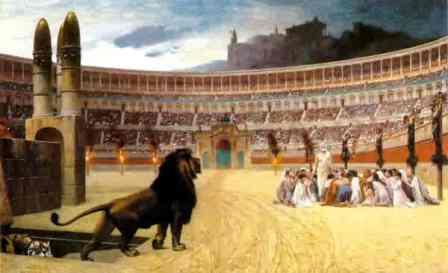
Certainly he was not asking followers of Christ to pose as martyrs. But there may come a time in your life, and in mine, when we are asked to give our all for the sake of the Gospel. Our Lord enjoyed perfect peace even though He was under constant threat during His ministry. His peace is ours in the midst of the conflict, and we can have calmness under pressure and triumph amid the tribulation. So let's whisper a prayer of thanksgiving for the lives of these in the Horn of Africa whose loyalty was undivided and who knew such devotion to their Lord. And as Americans let us remember that the more privileges we have, the greater the responsibility that rests upon us to use them for the kingdom.
1:05 PM Students, check out Bryan Barley's tips on building a theological library. Excellent advice, Bryan.
12:10 PM I thought of something when I read Alan Knox's statement that the family ministries he reports on his website are only the "tip of the iceberg."

Missions is a lifestyle of good works. It involves scandalous love in the midst of a post-Christian society. Christianity is not primarily a doctrine but a community. Yes, the Good News is to be believed and declared. Yes, doctrine is vitally important. But the verbal proclamation of the Gospel is, or should, only the articulation of the believing community's reality. This is the way the early church lived. We need to reclaim and then embody their practices as a way of life. Alan, thanks for this reminder of the centrality of love and good deeds among Jesus-followers. Thank you especially for the role model you and are your family are to your readers. In our individualistic and consumer-base culture, I can think of nothing more important.
11:47 AM Over at HuffPost, Luis Carlos Montalván's review of The War Comes Home: Washington's Battle Against America's Veterans contains this frightening statement:
One result amounts to an impassioned plea to the US government to wake up and undo the bureaucratic logjam that prevents wounded heroes from recovering. Glantz makes clear that the struggle begins the moment a service member returns home from the war zone. Veterans' readjustment to family, friends and society is often complicated or even sabotaged by the symptoms of Post Traumatic Stress Disorder (PTSD).
Glantz discusses Traumatic Brain Injury (TBI), the signature wound of Mr. Bush's wars that ravages the once able-minded. Citing mind-boggling RAND Corporation data, he reminds us that more than 320,000 veterans have experienced TBI while deployed to Iraq or Afghanistan.
Even more distressing is the way veterans are being stonewalled by their own government. It seems that they are being treated as mere labor units, and all for the benefit of a privileged minority. Our veterans are being degraded, humiliated, exploited, defrauded, and deceived. Surely we can do better than this.
11:06 AM Early leaders of the Anabaptist movement were concerned that the public ministry should be shared for the health and well-being of the church. Implied is a particular view of the "authority" leaders have. (I've written about this in my brief series on the Anabaptists.) How, then, is the church to think about authority? New Testament professor Walter Liefeld writes about this subject in his outstanding essay, "The Nature of Authority in the New Testament." It's a chapter in a book that has been out for many years but which -- I say this somewhat shamefacedly -- I read for the first time yesterday: Discovering Biblical Equality. On pp. 255-256, Liefeld makes one of the clearest and most important statements I've ever read about church leadership:
We may distinguish authority from leadership on the one hand and from raw power on the other. Leadership is used here as a general term to describe personal influence that generates a positive response among followers. It is earned, it may be invited, and it is voluntarily accepted. Authority, in the sense under consideration, is a narrower term used to describe the right to command others and to enforce obedience. It is usually conferred, through appointment or election, on someone having a position in an organizational setting. Power is usually thought of as an influence and authority that are seized rather than earned or voluntarily conferred.
Note carefully Liefeld's conclusion:
Often what begins as welcomed leadership or acknowledged authority is later transformed by an ambitious person into power or even tyranny.
I hope you caught the gist of what Liefeld is saying. This has long been a point of concern with me. The more one thinks of the church as an institution, the more one is likely to minimize "welcomed leadership." To put the matter another way, freedom in ministry is bound up with New Testament ecclesiology, which is (so I urge, as did the Anabaptists) nothing less than every-member ministry. Many examples of this could be mentioned. Can a woman teach a mixed Sunday School class? The answer depends to a large degree on how we respond to another question: Is she simply exercising a spiritual ministry of leadership, or is she assuming a position of authority? Or, can only certain "ordained" people preside at the Lord's Supper? Or, are there "offices" in the church? Indeed, are terms such as "overseer" and "deacon" titular or descriptive or both? Can a fellowship of believers that takes seriously Col. 1:18 ("we have one leader -- Jesus Christ") allow anyone to become the titular head of the church? I believe that a whole kaleidoscope of questions such as these is rooted in the doctrine of the priesthood of all believers.
Regardless of how one answers these questions, what we may not do, as is sometimes done, is to assume that our traditions are biblical. Church renewal will involve a frank and healthy discussion of these matters. All this to remind you that our seminar on Saturday, March 21 will discuss many of these issues. It is only three weeks from today, and I couldn't be more excited.
10:48 AM Becky just got off the phone with our beloved co-worker Tilahun, whose wife Sinteyahu is expecting her third child any day now in Gondar. She is currently at 42 weeks. The doctor is talking about possible surgery next week. C-sections are not very common in Ethiopia, especially outside the capital of Addis Ababa, so one can imagine the anxiety Sinteyahu might be feeling. Brother Tilahun, God gave us the greatest proof of His love when He gave us His own Son. Surely He will also freely give us "all things" (Rom. 8:32). Our trials of faith can be placed safely in His loving hands. Meanwhile, know that Mama B and I are praying for you and Sinte and your entire family constantly. We love you!
Friday, February 27
6:55 PM Well, I feel that God has been blessing my writing today. I've gotten about 2,000 words written (not typed), and am making good headway on my deadlined assignment.
As I sat at my writing desk today I pondered this thought: The apostle Paul, one of my favorite authors, lacked all of the advantages I have. He did most of his writing on the move, and much of it "on the run." He wrote in the midst of an extremely busy church-planting ministry. In other words, I don't believe we should think of Paul as writing as if he had all the time in the world, using the advantages of a modern home or office. He almost always wrote in the middle of incessant missionary activity. The exceptions were the so-called Prison Epistles. Here, I suppose, Paul had plenty of time to write. Yet even then he wrote to churches (and not for the academic guild) and always to deal pastorally with different situations that had arisen.

I think Paul is a very good role model for any Christian writer who also has a passion for missions. (Shouldn't every Christian writer have a passion for missions?) Paul was an apostle, not a theologian -- a church planter and missionary, not an ivory-tower idealist. In the world it is quite alright to call oneself a "scholar" and not be involved in other people's lives. But our Lord said, "As the Father sent Me, I am now sending you," and "Go into all the world and preach the Good News to everyone." I would suggest that only as we live sacrificial lives will God be content with our scholarship. God is continually rescuing people from trouble -- that is what "save" means. And what sinners need is not another weighty tome sitting on their library shelves but a hand to lift them up out of the mire of sin. It is just that liberation that Paul preached. He was never ashamed of the Gospel of Christ. For Paul, Christianity was a God-given opportunity to witness for Christ, whether alongside a quiet river in Philippi or among the intellectuals of Mars Hill.
That missions was at the heart of Paul's life may well explain why Luke in the Acts never once mentions the letters Paul wrote on his missionary journeys. Paul's epistles were composed in order to meet either a threatening danger or an incessant need, and for this reason they speak to our human condition today. But the letter-writing Paul was first and foremost the Gospel-preaching Paul, a man who poured out his life to help others experience the mercy and love of God.
As I sit at my writing desk tonight, I for one am very thankful for that example.
1:15 PM I have often referred to the German pastor Dietrich Bonhoeffer as a paradigm for our times. Having recently reread several of his works, I am more convinced of this than ever.
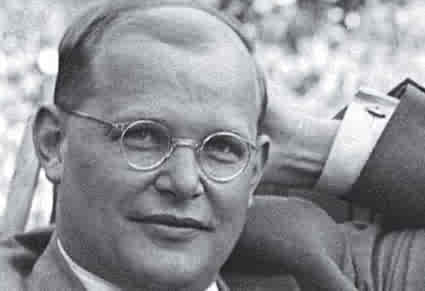
Bonhoeffer was a Lutheran theologian who had publicly criticized the rise of fascism and anti-Semitism in Germany and was systematically silenced by Hitler's henchmen, unable finally to publish any of his writings or to preach in any pulpit. He was only in his 30s when he was arrested by the Nazis. Bonhoeffer had participated in an effort led by officers of German Army Intelligence to undermine the German war effort. Attempting to build a case against him, the Gestapo kept him a prisoner. Incriminating evidence did not emerge until after the July 1944 attempt on Hitler's life. At this point his letters from prison stopped, and Bonhoeffer was transported to another prison and eventually to a series of concentration camps, only to be executed by the Nazis as VE Day approached. Had Bonhoeffer become depressed, bitter, and hopeless during his horrendous imprisonment, no one would have blamed him. Amazingly, his spirit soared higher and higher the longer his detention dragged on. People can debate the cause of this joyful attitude, but Bonhoeffer himself makes it clear that his hope and strength was due entirely to his belief in Jesus Christ and the presence of His Holy Spirit. I admire Bonhoeffer more than perhaps any other German because he was able to maintain his faith in the face of dreadful persecution from the political establishment. He saw the world at its worst and yet found affirmation and hope. He saw that a church co-opted by ideology and nationalism was no help to a society. Only a church that is truly free—including free to be a vocal critic of its society—can serve the world well. He deserves to be read and to be remembered.
The following are some quotes from Bonhoeffer that encapsulate his faith and hope in God. I offer them to you today for your consideration—and encouragement.
"One act of obedience is better than one hundred sermons."
"It is the characteristic excellence of the strong man that he can bring momentous issues to the fore and make a decision about them. The weak are always forced to decide between alternatives they have not chosen themselves."
"Action springs not from thought, but from a readiness for responsibility."
"If you board the wrong train, it is no use running along the corridor in the other direction."
"... the power of some needs the folly of others. It is not that intellectual capacities become stunted or destroyed, but rather that the upsurge of power makes such an overwhelming impression that men are deprived of their independent judgment, and—more or less unconsciously—give up trying to assess the new state of affairs for themselves. The fact that the fool is often stubborn must not mislead us into thinking that he is independent. One feels in fact, when talking to him, that one is dealing, not with the man himself, but with slogans, catchwords, and the like, which have taken hold of him. ... folly can be overcome, not by instruction, but only by an act of liberation. ...a person’s inward liberation to live a responsible life before God is the only real cure for folly."
9:33 AM Kudos to the Obama administration for lifting the ban on photographing coffins of troops whose remains are being returned to U.S. soil. I have always felt that this decision should be left up to the family of the lost soldier and not to the government.
4:15 AM Happy First Birthday, Nathan Tilahun. We love you so very much.
Thursday, February 26
5:34 PM It's been a great day. Here are a few pix. For starters, here's Caleb and Becky discussing Greek together. Caleb was very impressed that his Mama B is acing all of her quizzes.
Micah enjoys a sip of Papa B's coffee.
Isaac, the outdoorsman.
Off to split firewood.
Cutting up the logs.
Our log splitter is worth every penny we paid for it.
We had lots of helpers, as well as "supervisors," like Becky and Micah.
Here's the best-looking load of hardwood I've seen in a long time.
Right now I'm off to cook supper: Chinese, with my secret ingredient of course.
5:21 PM Kudos and best wishes to Matthew Montonini for endeavoring to memorize the entire book of Philippians in Greek. Odd, but I received an email from one of my Greek students this morning who told me he is currently memorizing the book of Romans in Greek. Go for it, guys!
8:14 AM Wayne Lehman offers some words of wisdom about Bible translation in an entry called Translation Gaps. He concludes:
The translation process is not complete until its original meaning has been communicated to its audience. Partial communication of original meaning is a form of inaccuracy. Yes, as much as I might prefer otherwise, I recognize that we cannot communicate all of that original meaning by filling every gap in the translation itself. No translation, however literal or idiomatic, can communicate every part of the meaning which was part of an original communication event. But we still need to be alert to what aspects of original meaning need to be filled in, one way or another, for our translation users.
I struggle with this issue all of the time. Just this week in Greek class I pondered long and hard over my own rendering of the first clause of Phil 1:27, which literally reads: "Only live as good citizens in a manner worthy of the Gospel of Christ." For starters, what does "worthy" mean? Deserving? Hardly. No one is deserving of the Gospel. My best hunch is that the Greek here means something like "in accordance with." I think Paul is saying that we need to measure everything in our lives by the Gospel, from the smallest thing to the largest thing. I am to live in accordance with the Gospel. I need to think of my suffering in the light of Gospel. I need to think of my time in the light of the Gospel. I need to think of my money in the light of the Gospel. This goes for EVERYTHING in my life: my so-called "vacation" time, internet usage, talents, possessions, family, etc. Then take the word "Gospel." What does it mean to live according to the Gospel? For Paul, the Gospel is the story about Christ -- His death, burial, resurrection, and post-resurrection appearances. His substitutionary atonement. His death on our behalf. But the Gospel also means living a humble life of love that consistently seeks the interests of others, even if it involves suffering and death. Am I willing to suffer for the sake of Christ? To be inconvenienced? I will be IF I am living my life in accordance with the Gospel.
So here's my admittedly tentative paraphrase of the first clause of Phil. 1:27: "The only thing that matters in life is that you discharge your obligation as citizens of heaven in a way that is consistent with the Good News about Christ -- His humble life of love that always sought the good of others." As Paul will put it in the great Christ-hymn of 2:5-11, it is the very nature of God not to grasp but to give.
Below: My analysis of Phil 1:27-30. The paragraph seems to have two colons. The first contains the command to live as good citizens of heaven in a manner worthy of the Gospel. The second colon explains why suffering is necessary. A possible paragraph title: "Earthly conduct of heavenly citizens."
7:52 AM A bit of good news. A congregation just emailed us to say they are seeking to raise $7,500 for the Galana clinic vehicle. That blesses my socks off. Praise the Lord for this precious encouragement. The Lord shows us His continual care by raising up both workers and suppliers for His harvest in Ethiopia.
There are 5 reasons why we need a vehicle for the clinic.
7:41 AM Thursdays are usually quiet days for me, but I'm looking forward to being happily occupied when Liz brings the boys over for a visit. It seems like light years since I've seen them. I might even invite them to help us shovel manure. Won't THAT be fun.
7:11 AM I'm sitting here reflecting on the words of Jeremy Anderson, who just wrote a blog entry called Why Four Gospels? How come I didn't know? Jeremy is at the place I was when I was in seminary many years ago: discovering that "these guys [the Gospel writers] were real." Does it make any difference if we understand the historical background to anything we're reading, including the Gospels? I think the answer is Yes. The New Testament is rooted in history. Not putative history, or make-believe history, or "Heilsgeschichte," but real history. I want my students to be able to affirm the complete historicity and apostolicity of the documents we call "the Four Gospels." (The earliest church, of course, never referred to four Gospels. For them there was only one Gospel in four different versions. Hence the name of the theory I espouse in my book: the "Fourfold Gospel Hypothesis.") I well remember hearing Francis Schaeffer in Switzerland saying that Christianity is a historical faith. And the Gospels stand in the very middle of God's historical revelation. The Old Testament points to the Gospels; the Epistles all flow from the Gospels. So it does us good to read the Gospels as historical works. But one word of caution: the Gospels are more than history. They are historic. Reading them will change your life, because in them we see the most beautiful Person who ever walked this earth. Paul put it this way: As we look into the face of Jesus we are changed from glory unto glory into that same image. So I never tire of reading the Gospels. And I know I will never outgrow my need to study the Gospels. They are trustworthy, historical accounts of the greatest life that was ever lived.
Meanwhile I've got a major publishing project due on April 1st. I am stuck. I'm ashamed of my lassitude and indifference toward this project. My brain is locked, and I can't find the key to the lock box.
Wednesday, February 25
7:35 PM As a boy growing up in Hawaii, I often heard stories about Father Damien of Molokai. Now I see that he will be recognized as a Catholic saint. Sainthood, of course, is not determined by a church council or a pope. But the story of Damien still has exemplary features. You can read about him, and the tempest that swirled about his career, here. (Ken Howard, by the way, played Damien in the movie Father Damien: The Leper Priest.)
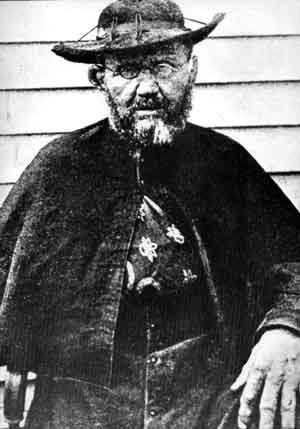
Whenever I think of Damien I think of the apostle John, whose loyalty to God was not rewarded by a larger salary or a bigger church but by banishment to a lonely island. In my own life I've discovered that the Lord has put a "Patmos" on my itinerary a few times as well. I've been led to devote a whole chapter in my new book to the Anabaptists' loyalty to the truth that cost them everything. John, Damien, the Anabaptists – some of God's choicest servants have taken demotion and have been shunted to obscurity and difficulty in one way or another for the sake of the Word of God. Ultimately, of course, John had his promotion (the "Revelation" he received). Such men (and women) were "content to let the world go by," and this is a choice, I suppose, every believer must make.
Below: Kalaupapa Peninsula, Molokai, Hawaii, site of the leper colony. Becky and I flew over this site many years ago.

7:12 PM Not that it matters, but I have begun snacking on pistachios instead of my all-time favorite junk food, Doritos. I'm in good company, too. Pistachios are one of Barack's favorite snacks.

7:08
PM
We had
33 Greek scholars-in-the-making in attendance Monday night at Bethel
Hill. I thank God for each one of them. No, they are not all at the same
level. No, they are not all doing well on the tests. But that's
perfectly OK with me. My advice? Figure out the size of your plate and
then fill it. Set realist goals for yourself. Having your own objectives
firmly in mind will help you more easily sustain your motivation and
interest in Greek. Here's one way you can set foreign language goals:
use the system set up by the Foreign
 Service
Institute. Depending on your needs and desires, you will want to shoot
for one of the following "R-Levels" (i.e., reading levels of
proficiency):
Service
Institute. Depending on your needs and desires, you will want to shoot
for one of the following "R-Levels" (i.e., reading levels of
proficiency):
R-1 is elementary proficiency. Anyone can achieve this goal – which involves a knowledge of the Greek alphabet and a very basic understanding of some of the language aids available today.
R-2 is limited working proficiency. At this stage you can read uncomplicated but authentic prose in Greek that contains common words and basic sentence patterns. You will still rely heavily upon on dictionary.
R-3 is professional proficiency. Here you can grasp the essentials of standard but uncomplicated prose without the use of a dictionary.
R-4 is full proficiency. At this final stage, you can read anything written in the foreign language without a dictionary. A very large vocabulary is the key that unlocks the door to this level.
If you can identify the level you want to achieve, you will be better able to focus your efforts and will feel more positive about your achievements because they will become more evident to you. If, in your current life situation, there are other things more important than Greek, I understand completely. Do what you can. If you only get 10 percent of what I'm teaching, you'll still have ten percent more knowledge than when you began. And remember: Paul had learned to be content in whatever state he was. I guess that included the "state of confusion." Amen?
6:19 PM Just back from the seminary. What fantastic classes I had. A warm thank you to all of my students who worked so hard and so diligently to prepare their assignments for class. It was a great week but tiring. I pulled into the farm about 6:00 pm, right behind Nate and Jess (and their ubiquitous manure trailer). I know what I'll be doing in the morning....
This week in Greek class we studied Phil. 1:27-30. It is a very convicting passage that calls me to repentance. There are over a billion people in this world who do not know the name of Christ. Paul is telling me (and you too) that the only thing that matters in life – the main thing that we can do with our lives – is to live in such a way that brings credit to the Gospel. Nothing in my conduct, nothing in my personal priorities, should get in the way of this one goal. Paul is saying that I have to have a singular vision. Selfishness is unworthy of the Gospel! Laziness is unworthy of the Gospel! Disunity is unworthy of the Gospel! Even complaining is unworthy of the Gospel (see 2:14)! Paul says in effect:
Above all, you must live as good citizens of heaven. You must realize that the United States demands your ultimately loyalty, but you can give your allegiance to Christ alone. This may involve suffering! But that does not matter. The only thing that matters is loving obedience to the Lord Jesus. That trumps EVERYTHING – family, home, and comfort. There's more to life than believing in Jesus. There's also suffering for Him. And listen – the suffering is just as much a gift of God as the trusting. So leave your comfort zone. You cannot escape in the anonymous crowd or under the umbrella of the church. You cannot register as a conscientious objector in today's spiritual warfare. It is required that you be found faithful to your calling. Christ's amazing love in dying for sinners must be the inextinguishable fuel that feeds the flame of your passion for the Gospel.
It's almost impossible for me to grasp the significance of what Paul is saying here. It makes a complete mockery of my smug complacency. It forces me to stop trusting in my own ability, eloquence, enthusiasm, and power and trust instead in the all-sufficient grace of God. True love always involves the sacrifice of self on behalf of others.
Am I willing to be this kind of a Christian? O God, make it so!
Monday, February 23
5:56 PM Well, we're all back to work again just as though Nate and Jessie had never been gone. We went to the old Renn House (ca. 1790) south of Oxford this morning to pull down the 1802 addition and to scavenge the roof tin and the beams. I regret intensely that such a beautiful and historic house has now joined the thousands of antebellum homes in the South that have been left to die an inglorious death through neglect and abandonment. The tin came off easily enough, but the beams were exceedingly difficult to lift. An epochal effort was required of the salvage crew, who are now nursing their aches and pains back on the farm. We've already used material from the Renn House in Bradford Hall, including an upstairs guest room (aptly named the "Renn Room") and other various and sundry places in the house (photos below). As for other news, there is none. Tonight's Greek class will, I suspect, be the cutoff point between the merely interested and the committed. Thus far it's been a riot of fun, though some are struggling valiantly to keep their kephalai above water. But here I must end my report, whose brevity can be attributed to my state of mental vacuity after a long and arduous day.
What was left of the Renn House when we arrived this morning.
Thar she blows!
The end of an era.
Getting up tin.
And stacking it.
"Careful, Dad!"
A door from the Renn House in Bradford Hall.
The "Renn Room."
8:25 AM Alan Knox has done it again, this time on the subject of worship. As everyone knows, I do not believe that the purpose of the weekly gathering is worship. I cannot find "worship guide," "worship team," "worship service" in the New Testament. I see New Testament worship as 24/7 (Rom. 12:1-2). That said, I am not as concerned about our misunderstandings as much as I am about the spirit of what passes as "worship" today. You cannot have the right music without the right words. Yet how much of our hymnody makes for good theology? The writers of "In Christ Alone" are, I believe, an exception to what goes today under the name "worship music." Some would have us think we can have worship music without words at all. They whip up a synthetic joy, a simulated ecstasy (just watch the moving hips). Sometimes during these moments of "worship" I spend more time sighing than singing.
Read and ponder what Alan has to say. Better yet, reread Romans 12 (the entire chapter), and you will see what worship is to be.
7:46 AM What a splendid, well-written, and carefully thought-out piece of prose the Greek of Phil. 1:27-30 is! It's perfectly absurd to think that the structure of this magnificent paragraph is not as heavenly inspired as its words. I am dreadfully disappointed to see that its main verb, the imperative politeuesthe, is not correctly rendered in most English versions. Please, please, please note its uniqueness -- and its reflection mirrored in 3:20 with politeuma. Paul would have us remember that our citizenship is in heaven, that the only Christian nation on earth is the kingdom of God, and that the only thing that matters is that we live as good citizens of this new commonwealth. Why, then, do we think that we can build a City on a Hill in this poor world through education, or democratization, or any other "ation"? We Christians are looking for a city that has foundations whose Builder and Maker is God.
I've just finished analyzing the syntax of this passage and am resolved to ask my students to produce their own diagrammatical analysis this week -- no matter how bad or simple. Even among the least trained linguist among us there is an intuitive sense of order and structure in the New Testament. Every time I read Philippians I feel a new warmth and reality about Paul's letters. I certainly have a great deal more to learn from them, and my frequent re-reading of the Pauline corpus doesn't seem to have had a dampening affect on my spirits.
7:32 AM So far, Mr. Obama's foreign policy has apparently been guided by Bush's theory that fear and force are the best motivators in the world. You get the feeling with O. that he's one step away from the Vietnamization of Afghanistan. If I had any clout with the president, I would advise him not to follow his predecessor's leadership that was marked with such a perfect record of bad judgment.
Sunday, February 22
8:05 PM This evening we had a delightful meeting with the deacons and WOM group at Tabernacle Baptist Church about the work in Alaba and especially in Bedene, a village that TBC has in a sense "adopted."
From the beginning, Christianity has always sent out its missionaries two by two, and TBC is no exception. Carolyn and Sudie have now traveled twice with us to Ethiopia and are eager to return. Unselfishness is the rarest quality in human nature, and it is a delight for Becky and me to watch people who appear to have no interests of their own serving Jesus and others in a faraway place like Alaba. It is a great example. This is what will always be so attractive about missions: the Spirit of Christ energized in the lives of normal, everyday Jesus-followers. TBC, we thank God for you and ask Him to bless your efforts for the sake of the Gospel.
2:51 PM Just back from having Mexican food for lunch with Becky. The weather has turned bright and sunshiny again, with a current temperature of 44. Tonight we've got a meeting about Ethiopia at a church near South Hill, VA, and before that I see that Nate has another trailer load of manure waiting to be unloaded.
Becky and I had a glorious time with the Body this morning. The morning message was at once timely and in time! It was a sharp critique of both church theology and state theology, recognizing the need instead for a prophetic voice calling both church and state to account, motivated by our faith in and sole allegiance to Jesus Christ. I am equally grateful to all those I spoke with briefly today and whose words were such an encouragement to me. I have so many soul mates at Bethel Hill I dare not begin to mention them by name, but you men and women know who you are. I thank God for the "pledge of allegiance to the Lamb" I heard today. "Not to act and not to stand," said Bonhoeffer, "simply for fear of making a mistake, when others have to make infinitely more difficult decisions every day, seems to me to be almost a contradiction of love." The Body of Christ has affirmed this guiding principle throughout the ages: the Christian is obliged to pledge his or her sole loyalty to Christ. I find that the ever-recurrent need of the church is to discover what it means to confess Jesus as Lord within the political and social structures of the day. I also think more and more that the idea of "cross-bearing" will take on a new meaning as believers in Jesus move from cultural conformity to radical obedience. For me, the church will always be an alternative community and by definition is constantly to be seen as a contradiction to the existing political order.
So, the whole meeting of the church today was boldly Christocentric -- for which I am truly grateful to the Head. I am a citizen of the kingdom of Christ! Amen and amen.
8:48 AM As I type a cold rain is falling in the Piedmont. But not to worry, Greek students. Bethel Hill, NC, will enjoy plenty of sunshine tomorrow. Remember to learn the paradigm of the Greek definite article, to memorize your vocabulary, and to translate and parse all your sentences. Tomorrow night's quiz has a total of 7 extra credit points on it. Are you up to a 107?
Praying for you!
8:16 AM Ancient Hebrew Poetry has stirred up a hornet's nest of sorts with an entry titled Ear Wax in James 1:21: Preserving Metaphors in Translation. In my Filologia Neotestamentaria essay "Literary Artistry in the Epistle to the Hebrews" I asked a similar question: Should translators attempt to render live metaphors into English? One I think we've perhaps missed is pherometha in Heb. 6:1, which could well be rendered something like, "Let us be borne along to full maturity." Phero is used in its literal sense in Acts 27:15 to describe a ship being "borne along" by the wind.

Perhaps the word picture here in Heb. 6:1 is that of the believer being carried along by the Holy Spirit, much like a sailing vessel is carried forward by the wind. (We tried to do something like this in the ISV New Testament.) This is a far cry from "Let us go on" or "Let us press on." I wonder, too, if there is not an allusion here to what the author wrote about Christ in his opening prologue: that indeed Christ is the one who carries all things onward by His powerful Word. To Jesus, then, belongs the work of providential progress in the Christian life, though of course we must be eager to do our part as well (see 4:11-13).
Hebrews is replete with athletic, nautical, agricultural, etc. metaphors. Have these been adequately rendered into English?
7:55 AM My esteemed father-in-law, Brad "Tex" Lapsley, sent these one-liners along yesterday:
-
If someone in a Lowe's store offers you assistance and they don't work there, you may live in Texas;
-
If you've worn shorts and a parka at the same time, you may live in Texas;
-
If you've had a lengthy telephone conversation with someone who dialed a wrong number, you may live in Texas;
-
If "vacation" means going anywhere south of Dallas for the weekend, you may live in Texas;
-
If you measure distance in hours, you may live in Texas;
-
If you know several people who have hit a deer more than once, you may live in Texas;
-
If you install security lights on your house and garage, but leave both unlocked, you may live in Texas;
-
If you carry jumper cables in your car and your wife knows how to use them, you may live in Texas;
-
If the speed limit on the highway is 55 mph, and you're going 80 and everybody's passing you, you may live in Texas;
-
If you find 60 degrees "a little chilly," you may live in Texas;
-
If you actually understand these jokes, and share them with all your Texas friends, you definitely live in Texas.

Saturday, February 21
3:52 PM They're back! -- and in grand style, I might add, pulling a trailer load of skubala behind them (the term appears in Phil. 3). Hurried greetings were followed by even more frenetic mucking, as Nate and Jess have to be in Warrenton, NC, at 6:30 this evening for a Civil War gala at which Nate is calling the dance. He'll also play a few numbers on his 1850s reed organ (photo). Boy does Jessie look hapai. They're going to have to wiki wiki if they are to make the ball in time. (Pardon the Hawaiian, but Jessie lived on Oahu for a time and understands exactly what I'm saying.)
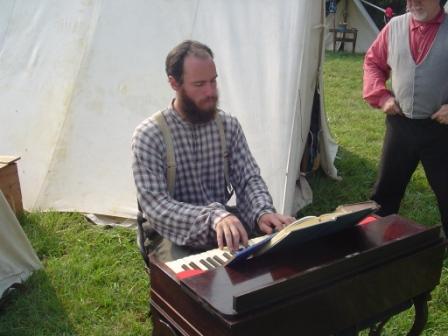
2:02 PM I'm sitting here at the computer awaiting the sound of Nate and Jessie's van driving up the long gravel driveway to Bradford Hall. The sense of anticipation of their arrival grows exponentially. Odd, but as I sit here waiting I keep thinking about the TV series Fantasy Island and the show's obligatory opening exclamation, "Da plane! Da Plane!"
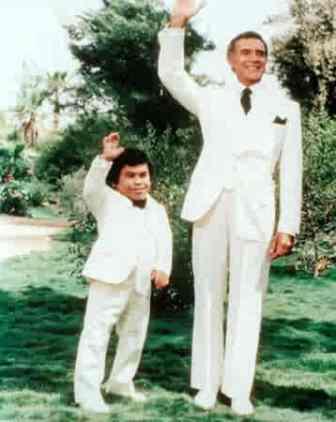
Patience, me boy, patience.
1:35 PM Over at the Better Bibles Blog, David Ker's remarkably sensitive and perceptive antennae have tuned into yet another conundrum of Bible translation: Section headings. I wonder: Is there anybody rethinking these for the next edition of the UBSGNT?
1:15 PM A couple of book notes:
1) This week I encouraged my Greek students to acquire and read James Barr's classic work The Semantics of Biblical Language. Barr is the fountain of all wisdom on the place of linguistics in biblical studies. You are too frenzied if you cannot take a moment to read his foundational treatise. The book "demythologized Kittel" and set the stage for all subsequent linguistic work in Greek and Hebrew.
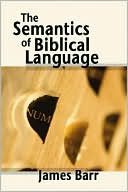
2) I will immensely appreciate any advice you can give me concerning the latest edition of my beginning grammar, Learn To Read New Testament Greek, which will be released on March 1. The same goes for its companion volume, Learn to Read New Testament Greek Workbook. I am happy to acknowledge my debt to David Croteau, Ben Gutierrez, and Cara Murphy for what they have already done and my confidence that the usefulness of their book will be widely recognized. Still, your constructive criticism is most welcome. I have an irresistible, perhaps congenital urge to see that complex machinery operates very smoothly.
9:12 AM How can the Republicans swat away talk of government intrusion in light of their latest attempt to take away our civil liberties (see Bill Proposes ISPs, Wi-Fi Keep Logs for Police)? Shades of Mr. Bush's "No nation can be neutral in the struggle between civilization and chaos." I guess it's better to implode the right to privacy than to confront terrorism in the terrorist-breeding swamps we've created in Iraq and Afghanistan. And I thought the Republicans were supposed to be the party that had contempt for big government. But, of course, these are "desperate times" that call for "desperate measures."
9:02 AM In regard to my latest reading project -- The Spotsylvania Campaign -- I'm reminded how insidiously easy it is to lose one's sense of perspective and mislead oneself into avowing trite formulas about the war. If, for example, you have always thought that General Lee gave top subordinates too much discretion and was too much of a gentleman to make hard decisions regarding personnel, you'll need to rethink your beliefs in light of this bloody campaign. Lee could handle men as well as he could handle Traveler. (Please do not equate Lee's outstanding equestrian skills with those of the stumbling Martin Sheen in the docudrama "Gettysburg.")
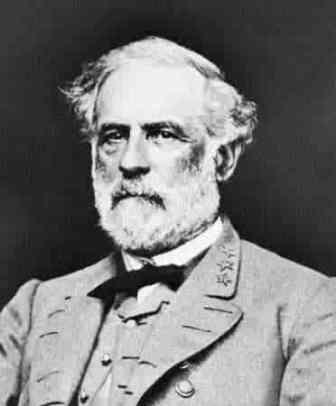
Beyond that, Spotsylvania taught the war-weary soldiers on both sides that the spade was the rival of the musket -- witness the siege of Petersburg in the ensuing months. Of greatest interest to me personally, however, was to see how ready Lee was to accept full responsibility for the consequences of his decision concerning the Mule Shoe -- removing the Confederate artillery prematurely. I was also delighted to observe in my reading that the horrific nature of war was never downplayed. (Kudos to editor Gallagher.) Quite a contrast to those stiff, laborious little compositions that glorify militarism. This book is at once exasperating and bewitching, and I recommend that anyone who is interested in Virginia history read it. Nothing here of the stuffed-shirt dreaded ennui of much military history.
7:47 AM Joe Sobran shares with us his pet peeves about the English language. A couple of samples:
Among the great political abuses now current in English is the use of “defense” for “military.” Expenditure for the manufacture of countless terrible and costly weapons of mass murder is now called “defense spending.” The phrase “national security” is similarly abused.
Nowadays, “democracy” is what Richard Weaver called a god-term. To be democratic is to be good, and whatever is good must be democratic. Why? Nobody explains. In fact, it’s rare to find a useful definition of democracy.
He could have added "Homeland Security."
7:23 AM Students of theology, here's a little test for you. How quickly and easily can you translate into idiomatic English the title of Cornelius Lipponer's latest blog post: Was mich zurzeit beschäftigt. Lexicons are not permitted.
6:45 AM Today our little Sheppie is one happy doggie.
This morning his masters return from a weeklong trip to Maryland to visit Jessie's family. I hear they did more raiding of the north than Lee did in 1863, including lots of thrift stores. Hope they got acres of books.
Hurry home, Nate and Jess, but drive carefully. We can't wait to have you back.
6:39 AM 161 years ago today Marx published his famous manifesto. Which reminds me:
1) Several years ago I wrote a tribute called Why I Love Marx.
2) In my book Why Four Gospels I call both Matthew and Luke "manifestos" (I believe they were written in that order). Matthew was a manifesto asserting the right of the Jewish-Christian church to exist alongside the world's greatest religion, Judaism. And Luke was a manifesto asserting the right of the Gentile-Christian church to exist alongside the Jewish-Christian church as complete equals. As you can see, when it comes to the Gospels, I like the term manifesto.
Friday, February 20
7:55 PM I have decided at long last that it is time for me to begin reviewing my Spanish and Portuguese. It seems like an enormous lot to do, and it is, but I feel guilty for having let these languages slide. I enjoy each one so much that I feel any review will be time well spent. I wish I could speak Spanish well enough to be able to lecture in the language (actually I did once, at the University of Madrid, but I read my manuscript). A colleague at the seminary just told me about a great opportunity to lecture at a Bible school in Guatemala.
Otherwise, today we had a delightful visit from one of the my newest doctoral students. It was a real pleasure to see him. We spent about 3 hours here at the farm. Becky brewed up a wonderful soup concoction for lunch. I told him a bit about my own doctoral studies in Basel, and how the professors had no offices in which to meet with students -- indeed, meeting with students one on one was a rarity of sorts. Where, then, did I meet with Professor Reicke? In his home, of course. In fact, the first month I lived in Basel I stayed in his residence, where I had access to his personal library. Those were some pretty awesome days.
Tonight I'm reading a new book on the Spotsylvania campaign.
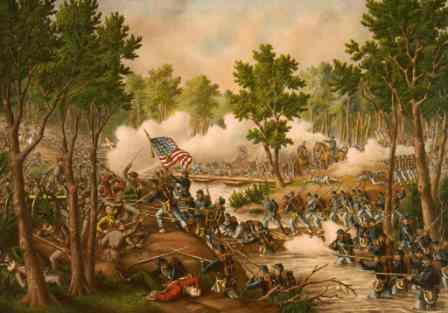
I borrowed the book from Nate and Jessie's ever-growing Civil War library/bookstore. Yes, most of their books are for sale online, that is, after Dad reads them first. Civil War history is a big, black hole. Once you fall in, there's no hope of ever getting out again. One day I'd love to lead a bus tour of Civil War sites in Virginia, Maryland, and Pennsylvania. After all, I've got so much free time.
7:25 PM For all you seminar addicts out there, here's list of church conferences to be held in 2009.
2:50 PM This summer I look forward to teaching the elders of the Alaba congregations about leadership. Our textbook? The Bible. Here are the course prerequisites, which everyone has to complete BEFORE they attend the class. Of course, the instruction and the assignments will all be done in Amharic, the national tongue.
A. Answer (in writing) the following questions:
-
Who alone is the Head of the church? (Read Matt. 28:18; Col. 1:18; Eph. 4:5; 1 Pet. 5:2
-
Who are the church's "ministers"? (Read Rom. 12:3-8; 1 Cor. 12-14; Eph. 4:7-16).
-
What are the functions of church leaders? (Read Eph 4:11-12; 1 Thess. 5:12-13; Acts 20:28).
-
Who appoints elders? (Read Acts 20:28).
-
Does the New Testament ever refer to a single "pastor"? (Read Acts 14:23; Phil. 1:1; 1 Tim. 4:17; Heb. 10:17; James 5:14; 1 Pet 5:1-2).
-
What titles are we to use for each other in the church? (Read Matt. 23:6-12; Mark 10:35-45).
-
Should elders/pastors receive a salary? (Read Acts 20:33-35; 2 Thess. 3:6-15)
B. Memorize perfectly the following verses:
-
Matt. 28:19-20
-
Col. 1:18
-
Eph. 4:5
-
1 Pet. 5:1-2
-
Eph. 4:11-12
-
Acts 20:2
-
1 Thess. 5:12-13
-
Acts 14:23
-
Mark 10:45
-
2 Thess. 3:10
Later, in Addis, I'll teach the entire book of Philippians, verse by verse. I am, of course, indebted to many others for their insights into these subjects and New Testament writings, but in going through books of the Bible verse by verse I hope to get us into the text, so that it is the text that we take back to our congregations. Paul's letters, and the whole New Testament really, richly illustrate the fellowship and witness of the earliest Christians. They reflect a pluriformity and flexibility of ministry only rarely seen today. My hope is that we would go beyond the "priest-craft" model of ministry to the service model of ministry as found in the New Testament.
1:34 PM The Greek term translated "ministry," as my Bethel Hill Greek students learned this week, is diakonia. Diakonia is not limited only to fulltime workers or to certain "officeholders" in our churches. Every believer is a "minister," and every believer is to be engaged in "ministry." The New Testament pictures the church as a community of serving people. This service is obligatory. It is to be exercised in the whole church and by the whole church. This is one of the main emphases I saw in Lionel Wood's latest interview, which is excellent: Interview with Author/Church Planter Jon Zens. Ministry has been given by Christ to His Body. All members of that Body are called to this ministry simply because all members have been called to Christ. It is a radical thought but true: Today Christ is being manifested in the world through His serving followers. So, are you a minister with a ministry? Do you know what your ministry is? Are you fulfilling that ministry? There is no Christian who cannot show the love of Jesus through deeds of service to others.
8:40 AM Notes in the margin:
1) We hadn't seen Steven Spielberg's "Duel" in years. That omission was rectified last night. Had Becky and me on the edge of our seats.
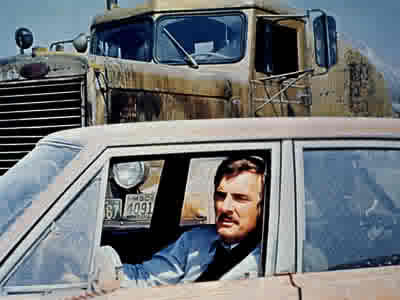
2) The beautiful weather has me and the dogs taking several long walks on the farm every day. Bright sunshine, even if there's no warmth in it. The Lord has sent plenty of rain, and we are hopeful of a good hay harvest in May.
3) I just accepted another Ph.D. student. He'll start in the fall.
4) As promised: Why Pedagogy Matters.
Thursday, February 19
2:40 PM Coming tomorrow: "Why Pedagogy Matters."
2:35 PM Maureen Dowd, the famous wordsmith, gives us a wonderful example of English prose in her book Bushworld (p. 446):
Paul Wolfowitz assumed that the Shiites, tormented by Saddam Hussein over their religion, would be grateful, not hateful. Wrong. It isn't a cakewalk; it's chaos.
I'm not interested in the politics of this pithy paragraph. It's the play on words that I find fascinating. "Grateful/hateful." "Cakewalk/chaos." The New Testament writers were not averse to using language in similar ways. "Liars ever, men of Crete, savage brutes that live to eat," wrote Paul to Titus, quoting a famous Cretan poet. The prologue of Hebrews (as we saw in class this week) uses a catena of "p" sounds to grab the audience and delight their ears. Elsewhere I have likened Heb. 1:1-4 to the narthex of a great cathedral. You are literally sucked into the interior. Who, for example, can ever forget their first visit to Notre Dame in Paris?

Why, then, do we students of the New Testament so often ignore rhetoric and her handmaidens -- assonance, alliteration, hyperbaton, homoioteleuton, and so forth? Perhaps it's because we fail to read the text as it was intended to be read: aloud. Let's try something. Read the following quote from Sir William Watson silently:
So to the wild wolf Hate were sacrificed/The panting, huddled flock, whose crime was Christ.
Now read these lines again, only this time aloud. Can you hear the difference? The New Testament writers often soar to the same artistic heights. They used quill to express every artifice of word and sound that the sonorous Greek language provides. And so, in my Greek classes we are always talking about this literary device or that rhetorical feature. I, for one, think we do the text a gross injustice when we ignore its literary artistry.
10:46 AM Ethiopia Update: Because of the recent recalls having to do with peanut butter, we have decided that at least for the present we will no longer take protein bars with us to Ethiopia. We'll let you know here if and when that decision changes. In the meantime, non-prescription reading glasses for the elderly still remain a top priority, especially in the 1.00 and 1.25 strengths. God bless all of you who so faithfully support these causes.
10:40 AM Despite its fixation on Afghanistan, the administration hasn't forgotten about China. Americans will never understand the Obama rationale for upping the ante in Afghanistan if they only look at the situation in the Middle East. The Axis of Evil has never included China for the simple reason that a sputtering American economy requires a status quo relationship with the world's next economic giant. By wrapping China in a warm embrace this weekend, Mrs. Clinton hopes to waltz it closer to democracy.

10:25 AM Heb. 6:1-6 is one of the most interesting passages in the Greek New Testament. The basic idea is that God, and God alone, enables us to make progress toward perfection in our lives. The elementary truths of Christianity are not to be forgotten, but they are only the beginning steps in a long process of growth.
What struck me as we diagrammed this passage in Greek class yesterday is the logic of the text as the author moves from aorist tense participles to present tense ones, how he employs embedding, and how he even uses a definite article in a way that has a crucial impact on our understanding of the passage.
The ancient Greeks believed that great thoughts required great dress, and the man who wrote this epistle was a tailor of the highest order. (We all know, of course, that the author was Paul.) If only in my own studies I had learned the great truth of inspiration earlier -- that not only are the words of Scripture inspired but also the syntax, the structure, the style, etc. When we examine the biblical text closely we see that there is every reason to believe that inspiration involves far more than lexemes. Life is quite different when Jesus teaches us how to look at things!
7:35 AM Jessie reflects on what she was doing just one year ago. "It wasn't until I waited that I got what I wanted." Now that's some pretty deep homespun truth.
6:25 AM The latest addition to our home page is called Howard Marshall on Christian Harmony.
6:20 AM Three things I learned from Harold Hoehner. I add my hearty Amen.
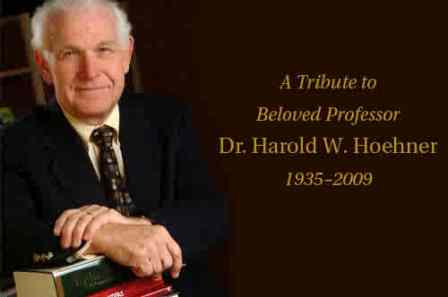
Harold's memorial service is today at Scofield Memorial Church in Dallas. My in-laws will be attending.
6:18 AM This email put a smile on my face:
Regarding your 8:20 am post for Feb. 15: If "all of God's people are to be cosmonauts," then I guess that means we really are naut of the world!
6:16 AM Wow. WOW! Your prayers for Ethiopia are being answered in miraculous ways. Here’s an excerpt from an email Becky recently sent out:
The well diggers have been authorized to continue digging to 40 meters (about 120 feet). In addition to praying for their safety & for water, please pray for my nerves....it really bothers me to think of these precious men being 10-12 stories deep in the earth! The "supervisor" of the diggers is spose to arrive tomorrow to check on things. Their spirit is very good; the clinic has provided housing for them & they are very happy with the situation. In fact (are you sitting down?), two of the 4 diggers has accepted the Lord Jesus as Saviour while digging on our well!!!! Isn't that wonderful??!!!
Speaking of spiritual fruit, Solomon (our chaplain) has reported that in the last month alone (!) EIGHT people have come to the Saviour!!!! And all of them are being followed & discipled by local churches! Wow!!!! Doesn't that make all the headache & work worth it??? Praise God for this bountiful harvest!!!! Please continue to pray for Solomon; at the moment he is home in bed with leg pains. He has been using the new waiting shelter and all the tools that we brought for him. God is SO wonderful to give us such a wonderful chaplain & so much fruit for our labor!
I think Becky’s exclamation points are well deserved, don’t you? Jesus is truly a Messiah for all nations.
Below: I meet chaplain Solomon for the first time.
6:10 AM Have you read the PSB yet (President's Spendacious Bill)? The first file is 496 pages. The second is 575 pages. (Both are .pdf.)
6:08 AM In praise of Ambidextrous Faith.
6:00 AM Becky and never tire of telling others about the good work in Africa. Last night we were at Antioch Baptist Church in Timberlake, NC. We joined several others from our Burji team, including Jamie and Miss Mary (photos). Next stop: Mount Pleasant Baptist Church in North Wilkesboro, NC.
Tuesday, February 17
5:12 AM Blogging buds: If you're coming to our Saturday seminar (March 21) in Roxboro and need a place to stay on Friday night, let us know. Private homes are available. (The experience of hospitality helps everyone grow.).
Last night's Greek class was a blast. Five students received a perfect 110 on their quiz, including the Lady of Bradford Hall. (Is my pride showing or what?) Right now I'm off to campus. When we hook up again online, I'll have a great quote for you from Howard Marshall's New Testament Theology. It'll blow you away.
Monday, February 16
2:55 PM Everywhere you look these days, everyone is kowtowing to Mr. Obama, who seems impervious to his weak-kneed opposition. "I'm the decider," 43 might say. I hesitate to interrupt the victory laps, but doesn't it seem like déjà vu all over again? In October 2001, Mr. Bush enjoyed a national unity and world favor as never before in our history. He wasted it by using the tragedy of 9/11 to pursue an agenda that pandered to his base and served the interests of his inner circle. Then he squandered a $4.6 billion surplus and plunged us into enormous deficits. Now it appears we've "misunderestimated" Mr. Obama's ability to do the same thing.

So much for "change." Personally, I think Obama is a lot smarter than Bush. And that's what's got me so worried.
2:26 PM One last thought for my Bethel Hill Greek students before we meet this evening. I think learning Greek boils down to two things. Really, only one: Hard work. There are no shortcuts if we are to master this language. Of course, for some of us language learning comes easier than for others. While some people can master the language without hardly batting an eye, there you are -- sweating and shaking. But this is true of every endeavor in life. Nathan gives practically no time or study to learning his trade. He possesses an intuitive knowledge, it seems, of repairing, building, restoring, etc. No wonder he can do practically any job he's offered. Et moi? Let's just say you wouldn't want me remodeling your kitchen or even changing a light fixture in your home. The average Christian seems to be under the impression that no lessons are needed in the Christian life, that practicing the faith is a simple art. Somehow we forget that Christian living is the greatest of endeavors and requires a lot of hard work and effort (by the enabling power of the Spirit, of course). To my Greek students who are struggling, I'm sorry if I gave you the (false) impression that Greek would be effortless. We know better, don't we? It's like building a long suspension bridge. It ain't gonna be done overnight.

So be sure you are setting aside enough time for your studies. And remember: Because your Lord has overcome the world, there is grace to meet and handle the pressures as they come.
(By the way, regardless of how well you do in class tonight, I'll still like you. Even if you haven't done your homework.)
8:53 AM I've just published Part 2 of Becky's Galana Clinic Report. All I can say is that God must love Becky and me a whole lot to allow us to work among the Burjis and Gujis.
7:35 AM If there's one thing we know about Johannine style, John liked to avoid redundancy. In fact, he loved to forego needless repetition. That's why he used so many synonymous words -- synonymously. I am shocked, amazed, stunned, and taken aback whenever I hear of someone insisting on a hard-and-fast distinction between agapao and phileo or oida and ginosko in John 21:15-17, for example. I own the famous Thesaurus by Roget (photo) and use it whenever I need a good synonym or antonym. (Here's the online version.)

In Greek class tonight we'll learn several different synonyms as part of our vocabulary assignment. It will be a good excuse for the professor to talk about what scholars call synonymy and semantic neutralization. If that's all Greek to you, come to class and I'll try and explain!
6:44 AM To finish my musings on the opening paragraph of Philippians (1:1-2), I must say a few words about the author of this letter, the apostle Paul himself, who is perhaps the best-known Christian in all of church history. We know from chapter 3 of Philippians that Paul had been proud of both his Jewish heritage and his zeal for God, so much so that he was responsible for the "blood of the martyrs" until the risen Christ had changed his life forever. Read Phil. 3:4-7 and you will see that Paul enjoyed every privilege a Jew could enjoy and how he willingly and deliberately abandoned it all for the sake of knowing Christ and making Him known. There are three things that stand out in my mind about the converted Paul.
1) The first is the landscape of his past. When I think of Paul's conversion I get tremendous hope. I'm reminded that God’s love reaches even the terrorists of the world – the Saddam Husseins, the Osama bin Ladens, and the Sauls of Tarsus. It's just like God to take a man called Saul and make him into an evangelist called Paul.
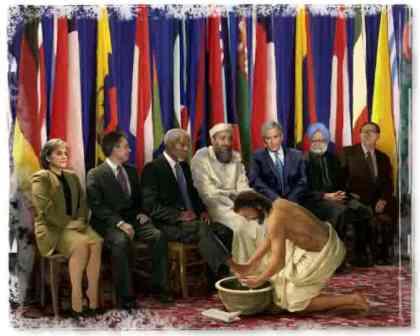
2) When I think of Paul, I am reminded in the second place of his scholarship. No, I'm not referring to his academic achievements or his publications or his reputation as a graduate of one of the world's leading universities. In fact, the term "scholarship" is completely redefined when I think of Paul's missionary life. I've often heard Paul referred to as a theologian. I can't dream of Paul ever using that term to describe himself. Paul wrote great theology, it is true, and he was a thinker of the first magnitude. But he thought of himself, first and foremost, as a preacher of the Gospel, a church planter, and a lover of souls. He was God's "chosen instrument" to take the Good News to the Gentiles, and to that single task he was fully devoted. He was, as every Christian should be, "separated unto the Gospel" (Rom. 1:2), and whatever publishing he did he did for one purpose: to advance Christ’s kingdom and to build up the church.
Many years ago I came to a similar conclusion in my own life. Like many others before me, I had viewed my scholarship as an end in itself, as an entrée into the world of academic conferences, as a means of gaining recognition and affirmation. But as I read the New Testament – a novel thing for a New Testament professor to do! – I began to see that my priorities were terribly misplaced. The words of Kierkegaard spoke to my heart (Provocations, p. 201):
The Bible is very easy to understand. But we Christians are a bunch of scheming swindlers. We pretend to be unable to understand it because we know very well that the minute we understand, we are obligated to act accordingly. Take any words in the New Testament and forget everything except pledging yourself to act accordingly. My God, you will say, if I do that my whole life will be ruined. How would I ever get on in the world? Herein lies the real place of Christian scholarship. Christian scholarship is the Church’s prodigious invention to defend itself against the Bible, to ensure that we can continue to be good Christians without the Bible coming too close. Oh priceless scholarship, what would we do without you?
Today I seek to use whatever scholarly abilities the Lord has given me for His service. Simply stated, I practice serving. The opportunities are endless to model the Jesus walk to others. Don't wait for politicians to bring about cultural renewal. Be the hands and feet of Jesus – evangelizing the lost, feeding the hungry, teaching the illiterate, caring for unwed mothers, rebuilding the broken walls of our culture.
3) Finally, it is significant that although Paul was Jewish, he was also very familiar with the ways and customs of the Gentiles. It should not surprise us that God would use such a man to be His primary spokesman for Christianity in a Gentile context. Down through the ages God has granted His servants skills that uniquely equip them for the service to which He calls them. Paul's Roman citizenship, for example, came in very handy as he traveled throughout the Mediterranean world, not least when he arrived in Philippi. The city was a Roman colony, its magistrates carried Roman titles, and its residents were fiercely proud of their Roman citizenship. Little wonder, then, that Paul wrote to the Philippian church, "Your citizenship is in heaven" (3:20), or that he urged the believers there to "live out your citizenship in a manner worthy of the Gospel" (1:27). Paul was always one to choose his words carefully, and nowhere is this clearer than when he uses politically-charged language in Philippians.
I can well appreciate this truth in my own life. The fact that it's extremely easy for me to minister in many different cultures owes a great deal to my birth and upbringing in the "melting pot of the Pacific," Hawaii.

Ethnic diversity was part of my growing up experience from day one. The same is true of Becky. Her childhood in Ethiopia has given her a refreshing adaptability wherever she goes. What a vast area of opportunity that opens up! It is not a little thing if you are able to live and work in a different culture and language. I often joke that one of my spiritual gifts is "eating." For some reason I can consume anything set before me and not get sick. Where did I get this ability? Perhaps it came from the multiethnic milieu of Hawaii, where I enjoyed Korean, Chinese, and Japanese food on a regular basis as part of a mixed bag of colors, races, and languages.
The lesson? God can use anything in our lives. He lets nothing go to waste. He can use for His purposes even the most mundane experiences in our past if we will let Him.
6:23 AM Janice Holt Giles concludes her book 40 Acres and No Mules with these thought-provoking words:
That man with a plow is a symbol to us of the great courage and heart of the common man everywhere. He is not merely the hill farmer. He is not merely the American farmer. He is all the little men around the whole wide world.
Today I offer a tip of the kepi to "all the little men" who have inspired a budding farmer in Mecklenburg County, Virginia.

6:18 AM America is wide asleep. How else can you explain our indifference toward the administration's views on civil liberties? And where is the outcry from the evangelical right, or the left for that matter?
6:04 AM Good day, bloggers and bloggerettes. It's a cold, wintry day, and I'm in a bit of a contemplative mood this morning. (Smile.) I've been amazed by the number of questions and comments about the church that come up time and again in my discussions with students. Several have realized that becoming the senior pastor of a large church is no longer a goal for them. Whenever I reevaluate my own commitment to Jesus, I am reminded that size and recognition are not important; only faithfulness is. Into my life have come ministries that are insignificant by the world's standards but are part of a long chain of opportunities to serve the Lord with special people who are unsung and unnoticed. I do not feel pressured in the least to be part of a mega-movement or a mega-church or a mega-mission or a mega-anything for that matter. I believe that one is truly wealthy when one is free from these kinds of Spirit-quenching pursuits. A farmer's economic wealth is to be found in the quality of the soil and the crop it produces.
Likewise the wealth that Becky and I value has been found in congregations where we have watched people grow and mature. We have been working in Ethiopia long enough to see the fruition of a number of our desires and goals. We are seeing churches in which lay leadership is being valued, where local churches are looking outside of themselves and linking up with other churches, where discipleship and not decision-making is becoming the focus, and where the downward path of Jesus is being followed with passion. I am quietly amused when I hear of someone who wants to plant a church in Ethiopia. They seem surprised when I tell them that the church already exists in that country, even in the Orthodox north. On the other hand, I am always delighted to hear of a church that is eager to link up with the Lord's church in some other nation, working together for the sake of the Good News.
How much longer can we continue this work? Becky and I are firmly locked into the middle years of life. But no matter how many more years the Lord Jesus gives us to travel, our constant prayer is that we will grow to be more Christ-like and obedient as we serve some portion of His great church. I have learned again and again that the business of helping to establish the Lord's church in Ethiopia is not our work but God's, and that it is all about people, not methods or programs. We've had a long enough length of time in country to realize that everything we've experienced has been worth it. There is no greater privilege than to be partners in the Gospel (Phil. 1:5) and to watch the people of God mature into Christ-likeness!
Sunday, February 15
6:20 PM Hey there, Bethel Hill Greek students. Just a reminder: for tomorrow night's quiz, be sure that you have read chapter 4 carefully, memorized the assigned paradigms, learned your vocabulary, and translated and parsed all the sentences in your textbook (checking your answers with the key in the back). For help with vocabulary, you can also check out these flashcards and these vocabulary cards. On tomorrow's quiz there will be a total of 10 extra credit points. See if you can score a perfect 110!
I leave you with these famous (last) words:
Greek is a language, at least it used to be,
It killed off all my friends, and now it's killing me.
All have died who ever spoke it,
All have died who ever wrote it,
All have died who ever learned it,
Blessed death--they surely earned it!
8:23 AM A proverb for all my pastor-teacher friends:
The one who multiplies workers is greater than the one who does the work.
8:20 AM Have you ever thought of your local church as a Cape Canaveral, a launching apparatus designed to project members into orbit for Christ right where they are and even beyond? All of God's people are to be cosmonauts -- "cosmo" coming from the Greek word for "world"!

6:52 AM Off to muck horse manure.
6:50 AM Maurice Robinson has published Harold Greenlee's response to a negative review of his revised primer on textual criticism. Greenlee's is a wonderful attitude. Harold, in case you didn't know, received a Festschrift in his honor several years ago. I had the honor of editing it. It's called Scribes and Scripture: New Testament Essays in Honor of J. Harold Greenlee. Harold has always been known for being a superb popularizer: simple without ever being simplistic. I for one deeply appreciate the wisdom God has given him.
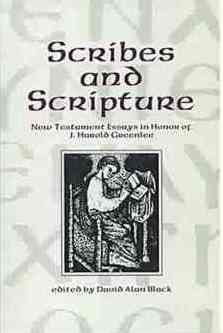
6:42 AM Should mission agencies "compete" with each other for funds or territories? More on this in coming days.
6:34 AM Some years ago, on a trip to Israel, I was taken to a pottery shop in the city of Hebron. I stood in amazement as the potter shaped and spun clay into magnificent pots and pitchers. Suddenly he stopped his work. Taking a clay pot he had just finished shaping, he pushed it back into a clump and tossed it away. I was aghast. The pot looked fine to me. Perfect, in fact. But the potter's eyes had caught some tiny defect, and the pot had to be completely remolded.

All of us are like clay pots in the hands of the Potter. I like to think of our upcoming seminar on ecclesiology as an affirmation of our willingness to allow God to do His "beautifying" work in our lives. I know that's true for me. I am ready to reaffirm before God that I am willing to allow Him to shape my thinking about His Bride. Such shaping means learning from failures and mistakes. It means asking God to uncover those unbiblical presuppositions that lie beneath the surface of my consciousness. It means releasing my agenda and giving it to Him for His resolution. I believe that God has purposes for my church -- and yours -- that He has not yet unfolded. Cooperation with the Divine Potter means risk and potential failure. I'm sure it will mean of lot of difficult decisions. Friends, let's not settle for the status quo. Let's keep on growing into maturity. Let's sharpen and expand our thinking. Let's learn new insights from the Old Book. Let's ask good questions that pave the way for further dialog. Let's allow ourselves to be remolded and reshaped. I think that is vastly preferable to being tossed back into the clay pile, don't you? But even if that is what God has to do with me, I am willing!
Saturday, February 14
9:38 PM A big shout out to all our buddies at Bethel Hill. Yall did a great job at the Valentine's Day dinner tonight. Becky and I had to leave early to attend a wake in Clarksville, just as things were winding up. What a goofy, crazy, fun-loving group of people our church family is. All in a good cause too: the dinner was a fund raiser for Ethiopia. My thanks to all. We love and appreciate you!
1:05 PM Peter Link has begun a very useful series on teaching the Bible. Check out his Guideline #2. Referring to the use of printed Sunday School curricula, Peter writes:
...teachers should teach the Bible and not other material because Scripture is what gives life and helps the class (and the church as a whole) to focus itself on God's mission and not someone else's mission. When the Bible is taught book by book, part by part, verse by verse then God's ideas of who He is and what He did and does frame the discussion and ministry. When any other material becomes the focal point, God's ministry is relegated to second-fiddle in favor of the designs of a teacher, publisher, or author.
I couldn't agree more with you, Peter. In fact, Becky just wrote about this in an email to a missionary who inquired recently about how one would go about planting a church in Ethiopia:
The Lord has already planted His church in Ethiopia; it is alive & well. So we do not do church planting there, nor do we try to start something new. Rather, we have offered ourselves as servants to the church that is already there, to help in whatever capacity He appoints thru the leaders of the church. We always work under the local church leaders.
We work under the local churches in 3 places in Ethiopia (Burji, Alaba &
Gonder), plus misc. teaching in the capital city. Each church (or group of
churches) is different. We do not come in from the outside in a top-down
sort of way, nor do we bring in the western orientation of "doing church".
Rather, we seek to serve them in whatever capacity they think best, since
they know their flock far better than we. And we always teach only the
Bible, teaching straight from the Bible, verse by verse, paragraph by
paragraph; we stay away from regurgitating what others have produced
(so& so's manual), as if somehow it has as much power & authority as the
Scriptures themselves.
Finally, we work to link churches with churches...forming partnerships
between the Lord's church in America and the Lord's church in Ethiopia.
From these relationships of love & mutual faithfulness come financial,
prayer and ministry partnerships over the long-term....much like the early
church did. In other words, the family dynamic enjoyed within our American congregations extends to our Ethiopian brethren in close, personal, loving relationships.
Becky is absolutely right about the way we (and those who go with us to Ethiopia) do Bible teaching. We use the text of Scripture, and we teach verse by verse. In May, for example, a pastor from North Wilkesboro will be teaching through the book of Ephesians this way. Last November a pastor from Roxboro taught through the book of 1 Corinthians in this manner. Last June I taught this way through the book of Philippians. I deeply appreciate the way Peter, himself a Sunday School teacher, elevates the Word of God above the words of mere men. Thank God for teachers like him!
12:35 PM In March we'll be participating in another Civil War reenactment in North Carolina. The historic Latta Plantation near Charlotte is the venue. The event is open to the public. Be prepared to be shuttled back to the 1860s. You can watch living history, show battles, period dancing, and even a period church service on Sunday morning (yours truly is bringing the message). The reenacting community is a huge mission field and definitely a major U.S. subculture. Like many other hobbies, reenacting is just plain fun. It also helps you see what life was really like "back then." Walk through the Federal or Confederate camps and you'll see exactly what I mean.
See you there?
12:12 PM Nathan is the world's ultimate pack rat. Of course, he always has very good reasons for depositing piles of floor boards here or roofing tiles there or scavenged chairs in between. We're constantly having to build new barns to accommodate all the accumulation. Much of it he sells on Craig's List.
I think there's a "pack rat" in each of us, don't you? Which brings me to this great description of the female wren (cited in Gordon MacDonald, Magnificent Marriage, p. 129):
If she proves receptive [to the male wren's courting], he escorts her around his prospective nest sites. The female almost always disapproves of her mate's home building efforts. After she selects one of his sites, she usually removes all of the materials and starts the next all over again. Sometimes she collects strange items. One nest contained 52 hairpins, 188 nails, 4 tacks, 13 staples, 10 pins, 11 safety pins, 6 paper clips, 2 hooks, 3 garter fasteners, and a buckle.

Talk about a lesson from nature! The only question is: Is the lesson positive or negative?
7:51 AM Continuing my discussion of the opening paragraph of Philippians (1:1-2): It is because cooperation in the Gospel is essential if we are to reach the world for Christ that Paul wrote to all the saints who are in Philippi. As we have seen, Philippians is fundamentally an appeal for Christian unity. It is organized in such a way as to allow Paul to address tactfully two women who had quarreled badly and were endangering the church's unity (see 4:2). It is because of the need to maintain the unity of the church that there arises in the very heart of the letter the great passage about selflessness and humility (2:1-11). Thus the words "to all the saints" (1:1) set the tone of the whole letter.
The word "saints" here is not so much a reference to behavior or conduct as it is a reference to the Philippians' position "in Christ Jesus." Far from connoting otherworldly piety, it pictures a people who are set apart from all other people because of their commitment to follow and obey Christ. Believers in Jesus Christ are the "different ones" – different because they live in the sphere of eternity and in the encircling presence of God. They are, moreover, consecrated to Him because of their special relation to Jesus. Like Paul and Timothy, they too are bond-slave servants of Christ Jesus, set apart for a different and special function in life. This function is nothing less than full participation in the work of the Gospel (1:5). The Philippians had been drawn together by the grace of God, and when people are really touched by God's unmerited favor their hearts begin to beat with the pulse of Christ and their love begins to go out to the men and women for whom He died.
The Philippians lived, of course, in two spheres simultaneously: "in Christ" and "in Philippi." Christians must live out their sainthood in this world. But wherever they live in the world, and whatever outward circumstances they may face, they are always in Christ, enjoying His presence and power. My "Philippi" happens to be Southside Virginia. Yours is wherever you reside. My job happens to be teaching Greek. Yours is probably something quite different. But wherever we live and whatever we do, we can do it willingly and cheerfully, because we do all things as unto the Lord and in His presence.
When asked how he attained such great victories, Nelson said, "I had the happiness to command a band of brothers."

The church is a genuine church only when it has the quality of togetherness. The Philippian church had been just such a church, a group of saints whose first concern was to put their Christianity into practical action. That this togetherness was in danger of being torn asunder did not prevent Paul from addressing his loving thoughts to all of them rather than to some of them or most of them.
7:27 AM Do you feel as weak and inadequate as I do today to serve the Lord? Here are some encouraging words for us all (Pollack, Hudson Taylor and Maria, p. 125):
God chose me because I was weak enough. God does not do his great works by large committees. He trains somebody to be quiet enough, and little enough, and then uses them.
Can I get an Amen?
7:15 AM It seems like a dream that happened centuries ago. But it was only a year ago that God brought Jessie and Nathan together. Becky was in Ethiopia and I was in China when the wonderful news of their engagement broke. (Joke: "Why didn't you two leave the country sooner?") It feels like Jessie has always been part of our family. She and Nate are absolutely perfect for each other.
I've been asked to repeat the story of their engagement many times. It really is mind-boggling. If you haven't heard it yet, I believe you'll enjoy reading what Jessie penned a year ago at her blog. Her post is entitled simply The Story. I think it's the perfect "love story" for Valentine's Day and a joyful reminder of the goodness and sovereignty of our great and good God. Enjoy.
7:05 AM On my radar:
1) Ethiopia arrests U.S. diplomat's alleged murderer.
2) Greece to open new Acropolis museum.
3) Virginia loses farmland as farmers grow older.
4) Film documents dying languages.
5) German language to be included in Yemeni schools.
6) Kailua Beach faces erosion problem.
7) Cowboy churches roping in new members.
Friday, February 13
6:35 PM Brad Otto is blogging from the National Pastors Conference in San Diego this week. Here's his synopsis of Day 2. An interesting point was raised in one of the conference sessions. Why is it that pastors are sometimes reduced to punching bags? How does one handle all that criticism?

Possibly, there's another side to the picture. A couple of years ago I blogged about a pastor who felt himself to be the target of all kinds of mean-spirited and unjustified criticism. No one else in the congregation seemed to be on the receiving end like he was. "Why do they always pick on the pastor?" he painfully mused. His conclusion? "Because of their unrealistic expectations." He had allowed himself to be placed on a pedestal, so it was easy to take pot shots at him. One day he said to himself, "I've had enough." So he quit the pastorate. But he didn't leave the church. He got off the pedestal, got a "secular" job, started teaching a men's Sunday School class, and -- voila -- he was no longer a lightening rod but just "one of the guys." He confessed that he never felt more fulfilled in ministry than when he got out of "the" ministry.
Just a thought....
5:45 PM Know what occurred to me today? That some of the most enjoyable and encouraging websites I visit on a regular basis are written by nonprofessionals. The writers are self-taught theologians. Sheepskins (like the kind we hang on our walls) may help, but even the trained professional remains a student and a lifelong inquirer. One can think deeply about theology without any formal education. I am not defending what is known today as postmodernism. (My theology can be described as classic, historic orthodoxy.) I am suggesting that none of us is free of subjective lens colors that shape our objective view of theology. Perhaps the best we can do for each other is to treat each other as fellow pilgrims, travelers whose progress toward spiritual maturity is always developing. So to all of my fellow pilgrims: Keep up the good work, and thanks for prodding me!
Below: A scene from Pilgrim's Progress.

12:48 PM This email blessed my heart:
I'm a "Youth and Families" Pastor. I just read an article of yours that puts what I have been thinking and feeling about for a long time into words. The name of the article is "Adult-Centered Youth Ministry."
As your brother in Christ, I just wanted to thank you.
12:23 PM Our weekly study in the Greek text of Philippians has been fantastic. Of all Paul's churches, the church at Philippi was the church to which Paul was closest, and of all Paul's companions no one was as dear to him as Timothy was. The great contribution of Timothy to Paul’s missionary service was that he could be entrusted with any task. His one desire was to serve Christ. Paul could therefore send him to Thessalonica, to Philippi, and to Corinth with perfect confidence that Timothy would get the job done. Like Paul, he was simply a bond-servant, a slave of Christ Jesus, His absolute possession and the One he owed absolute obedience (see Phil. 1:1).
Only rarely in life does one find such a trusted friend as Paul found in Timothy. Becky and I are extremely blessed to have known and worked with many such "Timothies." I'm not talking about people who merely put on a show of affection for others or who feign concern for the Gospel. I'm talking about believers whose sacrificial service for others in the name of Christ is exemplary, just like Timothy's was (2:19-24). I must tell you, these radical Jesus-followers are a great encouragement to us. Our work in Alaba, in Burji, in Gondar, our work among the nomads, the animists, the Muslims, the Orthodox of Ethiopia – all this work would be impossible without the willingness of Timothies who work with us side by side and shoulder to shoulder.
Sometimes our closest Timothy is our own spouse. I know that's true in my case. Jonathan Edwards' last words before he died were those of gratitude to his wife Sarah for the "uncommon union" they had enjoyed by the grace of God. Whenever I think of the partnership between Paul and Timothy or between Aquila and Priscilla I think of the similar kind of relationship I enjoy with Becky. We have the opportunity to spend large amounts of time serving the Lord Jesus together both in America and abroad. We have set priorities for our marriage that elevate the kingdom to a place of precedence over everything else in our lives. I am not ashamed to say that God has used Becky tremendously in my life to draw me closer to Him and to nudge me toward greater Christian maturity. Hudson Taylor, the famous missionary to China, had a similar relationship with his life partner, Maria. J. C. Pollack, in his book Hudson Taylor and Maria: A Match Made in Heaven (p. 102), writes:
Maria tempered without question his zeal, was largely responsible for the common sense and balance characteristic of Taylor at the height of his power…. Under the influence of her less mercurial yet gay temperament he shed those moods of melancholy; he would discuss every matter with her and forget to be introspective. He became more assured, grew up…. Her passionate nature fulfilled his warm-blooded yearning to love and be loved. She gave him full response, fostering and feeding affection so that together they had such a reservoir of love that it splashed over to refresh all, Chinese or European, who came near them.
If I could take you with me to Ethiopia, I'm sure you would be as blessed as I am to see Becky's servant-style selflessness. She is a woman of great faith and prayer and an indispensable part of our work in the Gospel.
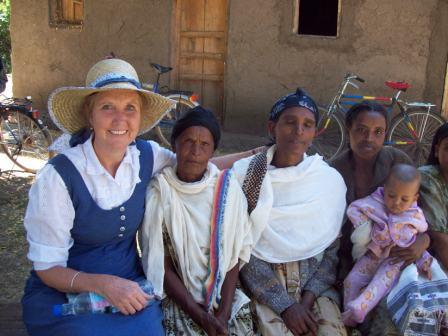
Notice in Phil. 1:1 how Paul elevates Timothy to his own level as a co-equal partner in the Gospel. Later he will tell the church, "I have no companion who has a spirit like Timothy does, no one else who is so genuinely concerned about other people, no one who lives so selflessly. He practically enslaved himself to me in the Gospel!" (2:19-24). Like Paul, I am a wealthy man because I have been blessed with such selfless companions in the service of the Lord Jesus. What makes my memories of Ethiopia so precious? It's simply the people – people who join us in the work, who faithfully continue the job, and who hand it on to still others.
Below: The elders of the church in Alaba, an area that is 99 percent Muslim. These are just a few of the "Timothies" and "Pauls" with whom we work very closely.
(Note: Becky and I are not opposed to missionary organizations. But we prefer to work independently and from local church to local church because we believe this is the New Testament pattern. And although we are independent, self-supporting missionaries, we are not mavericks. Our work in Ethiopia is done under the guiding hand and with the blessing of local church elders. This is true everywhere we work in that country. Our goal is to come alongside and assist the local ministers (all the members!) in their work. Moreover, we do not take just any volunteer to Ethiopia with us. Our team members come from local churches in the U.S. that have already established a relationship with other local churches in Ethiopia. They are, in a sense, "apostles" (in the non-technical meaning) in that they are personal representatives of local congregations in America who desire to work with other local congregations in Ethiopia. As much as possible, we encourage lay participation on our mission trips, although we are also very happy to take along pastors and other church leaders. To learn more about our philosophy of missions, please read How We Do Missions.)
11:33 AM We just tossed more manure. Not a good idea on a windy day, but that's life. Afterwards Jessie showed me their new business cards. They are fantastic. Nate and Jess must have had a blast designing and printing them on their home pooter. Kudos, guys. I will proudly pass them out.
9:41 AM In his book The Gift of Fear, Gavin de Becker describes for us the complicated combination of information that we obtain over the course of our lives and the in-the-moment flash of insight we receive from subtle clues without even knowing what we're doing. He says that the ability to do this -- to combine information with insight -- can sometimes save our lives. It's a powerful synergism.

The book of Proverbs likewise has a lot to say about combining knowledge with insight. We need information -- sound, biblical information upon which to base our lives. We need information, but then we also need wisdom to know how and when to apply that knowledge. It's like learning how to drive a car. We begin by studying the driver's manual. But we can't study the manual and drive at the same time. So what to do? You get a learner's permit and someone wiser than you sits down next to you.
The New Testament is like that driver's manual, and the Holy Spirit is like that driving instructor. Paul says in Romans 12 that we are not to be conformed to the world but transformed from it by renewed patterns of thinking. Reformation always begins with biblical knowledge, but we cannot stop with biblical knowledge. Knowing what the Bible teaches does no good unless we draw upon the Holy Spirit to show us how to live by the Bible.
I confess that all too often my problem has been one of lack of knowledge. I have blindly followed the traditions of men. In seminary I was rarely told to "follow the evidence." Thus many important questions were never asked (or answered):
Should churches incorporate?
Should churches be elder-led or elder-ruled?
Should elders be salaried?
Should churches meet in homes?
Should churches have membership covenants?
Should churches meet to "worship"?
Should churches be age-integrated or age-segregated?
Should we call pastors "reverend" or the "preacher?"
Should the pulpit be central?
Should the Lord's Supper be observed only once a quarter?
Should a man expect a "call" to the ministry?
Should we even talk about "the" ministry?
Should churches make decisions by a vote?
Should there be "term limits" on those who serve as elders?
These questions, and many others like them, were rarely if ever asked. But Proverbs says, "Say to wisdom, you are my sister, and call understanding your friend." We do not need to be afraid to ask questions. In fact, I think we need to question everything we do. Why is the pulpit in the center of our sanctuaries? Why do we call them "sanctuaries"? Why do we call our meeting times "worship services"? Why is the preacher literally elevated above the congregation? Why do we call him "the preacher" anyway?
Don't be afraid to ask these kinds of questions. Remember that Sister Wisdom is sitting next to you. You can draw on the Holy Spirit's skill and experience, just like when you were learning to drive alongside your driving instructor. My teaching ministry (including my publications) has always had one aim -- to convey the results of scholarship to the average Christian and to set him or her or to thinking. A. S. Peake once called himself a "theological middleman," and I am happy to be considered the same. The primary aim of my instruction has never been merely academic. I want my students to be equipped with the tools to think on their own, to rethink their traditions, to either confirm or graciously reject them, and above all to follow Jesus more nearly in obedience to His Great Commission. It's a great joy to see my students approaching the New Testament with greater confidence, with a feeling that it indeed holds the answers to their questions, and with a conviction that if we study it faithfully we will lay it down thanking God that He has not left us without a word for our edification and inspiration.
7:26 AM Good news. Our son Bereket's cow has finally had her baby. This means that Bereket can now start his dairy business. And here's more good news: the baby is a female, so his herd can grow even larger. Everyone here at Rosewood Farm praises God for this wonderful provision.
7:16 AM The Anabaptists, whom I greatly admire, taught that the church is composed of exiles and strangers on earth. Their motto might have been, "Here we have no lasting city, but we seek the city that is above" (Heb. 13:14). But this scarcely meant withdrawal from the world. The Christian, they said, must be apart from the world but never aloof from the world. The Letter to Diognetus said of Christians, "Every foreign land is their native land, and every native land their foreign land.... They pass their days upon earth, but their citizenship is in heaven."
What does this have to do with Becky and me? More and I am becoming convinced of the need to disengage myself from unwarranted allegiances to "my own" -- whether family or nation. I love my family and my country. But I am first and foremost a follower of Jesus and a citizenship of His kingdom. The church is a multiplicity of cultures and languages, and I believe there is no better way of demonstrating in a practical way the unity of the church than by working together across the cultural divide for the sake of the Gospel. The church is a Christocentric fraternity that goes out of its way to serve people of all sorts, not only "our kind." We cannot convert the world if we flee into our monasteries or convents or churches, or hide behind our flags. Nor can we depend on a small but dedicated cadre of "missionaries" to get the job done. It will take all of us -- the full membership of Christ's Body -- to fulfill the Lord's Great Commission. This is why I am such a supporter of the doctrine of the priesthood of all believers, for it is this doctrine that is our greatest hope for fulfilling the Gospel cause. The mission of the church to the world cannot be fulfilled by washing our hands of the world but by penetrating it as witnesses to the love of Christ and the truth of Christianity. And it is the "laity" that needs to be stationed in the front lines. To be the church means that all Christians are sent to our world to infect it with the liberating, scandalous love of Jesus. It means that every Christian is a full-fledged "minister of the Gospel." And it means that leaders in our churches need to release the ministers to do the work of ministry.
This is why you need to read Lionel Woods' latest essay.
Thursday, February 12
5:51 PM Yikes! Make that "weeks." (Thanks, Liz.)
5:15 PM A day in the life...
Nate and Jessie stopped by Bradford Hall this morning before driving to Raleigh to finish their remodeling job. Jessie is now 23 months along and looking great.
I went down to the mailbox and snapped this pic of N. and J.'s farmhouse. It's one of the loveliest views on the farm.
The dogs took me for a long walk.
Becky is very excited about her new ionizer that "mekes" water what it should be.
She's also been studying her Greek today. Nouns of the second declension, to be exact. She has aced everything so far in the class.
I've been able to get some good writing done today, praise the Lord. About 2,000 words so far. Hope to get some more writing in this evening.
So much for today's farm report.
4:12 PM I've just posted my thoughts about the passing of Harold Hoehner. My remembrance is called Harold Hoehner: Co-Yoked with Christ.
12:18 PM I just received news that a very close friend and colleague of mine is now with the Lord. To read about the life and work of Harold Hoehner, you can go to the DTS website. The family is in my prayers.
9:45 AM I'm praying about attending this conference (.pdf) on the Dead Sea Scrolls at MBTS. Anybody else going?

9:03 AM Our seminar (.pdf) is fast approaching. Have you made plans to attend yet? Kindly RSVP to Jason Evans, shepherd-teacher at Bethel Hill Baptist Church, at evans@esinc.net.
One thought. When I played basketball in Hawaii, I never once saw my coach playing on the court. But pastors are to be player-coaches. I believe that many of our clergy today crave lay participation, even lay equality. The question is, "How do I go about doing it? How do I get off the pedestal when it is the laypeople who have put me here? How do we get to the point in the church where the people see themselves as ministers and the ministers see themselves as nothing more than people?"
I believe the Bible's teaching about the church is realistic, straightforward (you don't need a seminary education to understand it; let me repeat, you don't need a seminary education to understand it), and full of common sense. But the Bible also teaches that we can never become preoccupied with anything other than Christ, and that includes "biblical ecclesiology." In Romans 12, Paul shows us what our top priorities are to be, regardless of our personal convictions about this or that point of ecclesiology. We must:
-
Love each other sincerely
-
Hate what is evil and cling to what is good
-
Be affectionate toward each other because we are all members of one family ("family" is not a metaphor here, friends; we really ARE a family)
-
Give each other priority by humbling ourselves and honoring others
-
Rid ourselves of sluggishness and lethargy
-
Maintain our spiritual fervor
-
Grasp every opportunity to serve the Lord Jesus
-
Meet trouble with a triumphant confidence
-
Persevere in praying for others
-
Share what we have with God's people who are in need
-
Open our homes to strangers
-
Ask God to bless (and not curse) our persecutors (this is not limited to the first century, friends; persecution is very real where Becky and I work in Ethiopia; believers are actually being imprisoned and murdered for their faith)
-
Laugh with those who are rejoicing
-
Shed tears with those who are weeping
-
Live in harmony with each other
-
Avoid all pride and snobbishness ("Look at US -- our church is a BIBLICAL church!")
-
Gladly associate with humble people (or, "gladly perform humble tasks"; the Greek permits both renderings)
-
Never return evil for evil
-
Live at peace with each other (though this is not always possible; peace is a two-way street, but we must see that our side of the road is open to traffic)
-
Refuse to seek revenge
Many a congregation had been torn apart because those who hold to a "biblical" view of the church are contemptuous of those whom they regard as die-hard traditionalists. I'll say more about this problem later, but for now please remember that nobody at our seminar will be telling you what to do or even how to think. But they will get you thinking!
8:37 AM Thursday shout-out to Dan of Cerulean Sanctum, who lists his most-read blog posts of 2008 here. Agree or disagree, you will never find a visit to Dan's site a waste of time. In multos annos!
8:17 AM Tilahun, who coordinates our North Gondar outreach in northern Ethiopia, sent along this photo of his wife Sinteyahu. They are expecting their third child in the next two weeks. Please join Becky and me in praying for a safe delivery and a healthy baby. Tilahun and Sinteyahu have been the hands and feet of Jesus to us whenever we travel north. We are deeply honored and blessed to stay in their home, incurring a debt of gratitude that we can never repay. They are a wonderful reminder to us that Christianity is a faith not only of the open heart but the open home.
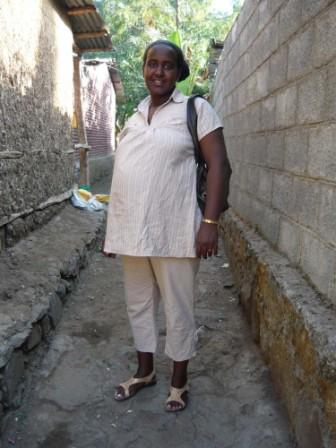
8:02 AM I just reread the essay I linked to below about the meeting of the church. I was struck by the church's name: Milpitas Bible Fellowship. You know what passage in Acts my mind immediately went to? Acts 2:42. The early church spent their time, Luke says, in the "apostles' doctrine and fellowship" (the latter term is unpacked for us in the words "in the breaking of the bread and in the prayers"). Their focus was on learning biblical truth from the apostles and on edifying and encouraging one another. Today, of course, the apostles' doctrine is to be found in the Word of God. Thus the focus of the gathering, it seems to me, was on truth and relationships, culminating in the celebration of the Lord's Full Meal, where Jesus was the unseen but very present Guest of Honor. (Christocentricity, not pulpit-centricity or anthropocentricity.)
I've often thought to myself, "If I were to be part of a new church plant, what would I call our new assembly?" The word "church" would be out -- that's a no-brainer. The more I think about that question, the more I like "Bible Fellowship." We gather together to encourage one another in the things of God, based on the Word of God. Our gathering would be called, not a worship service, or an evangelistic service, but an edification service. The essay below summarizes it beautifully:
Instead of focusing our meetings on evangelizing the lost, we need to utilize them to equip the saints to evangelize the lost all week long in their neighborhoods, schools, and workplaces. Instead of directing all our focus Godward in our meetings in songs of praise and worship, we need to remember that we have gathered with our brothers and sisters to strengthen them in their faith so that they will worship God twenty-four hours a day, seven days a week by their obedient lives. And instead of spending all our time listening to one man preach sermons, we need to make time in our meetings for all of God's people to seek to minister to one another through words of exhortation, encouragement, and instruction.
If we really believed this, if we really accepted it as biblical truth, I believe it would change EVERYTHING. Our focus would return to the biblical focus, our purpose would return to the biblical purpose, and our absent but returning Lord would be honored in a way that He himself instructed us to honor Him.
7:37 AM More disturbing news about Mr. Obama's domestic policy. I can't say I'm surprised.

6:56 AM The one-and-only J. P. discusses his latest book: The God Question.
6:50 AM At the Washington Times we find a good historical overview of America's nation-building habit and a demonstration that it's not really necessary – or constitutional. The piece, by Bruce Fein, is called Is an Empire Necessary?
6:43 AM The correct way to weigh yourself.
6:39 AM Greg Birdwell offers some useful advice on how to do Greek word studies. The man is a brilliant wordsmith as well. Case in point:
Be very careful with verbs. If there is the potential for false "wow factors" in Greek nouns, Greek verbs are like crack cocaine. Greek verbs are very easily abused in word studies because they hold so much more information than do English verbs.
I confess that I was once a verb addict but have since repented in terry cloth and ashes.
6:30 AM What’s the word for "blog" in Modern Greek? Answer here. The essay, by the way, is about the Greek government's push to ban anonymous bloggers.
6:23 AM The LDS gets something right. A snippet:
"We like to do [our welfare projects] on our own," the late President Gordon B. Hinckley said at the time. "Once the government is involved, regulations follow."
As Ron Paul has put it:
Money is the Trojan horse that government uses to infiltrate and infect organizations.
6:17 AM Why does the church meet? Here's one answer to that question.
6:15 AM I want to make it perfectly to everyone that I do not consider myself to have "arrived" when it comes to dealing with the trials and hardships of life. As Paul wrote in 2 Cor. 4:7, as a human being I am a relatively inexpensive and very fragile container of God's "treasure." But God allows me to experience growth moments in which I can gain a clearer vision of how to reflect the splendor of God and the joys of personal relationships. I am trying to get a handle on what Paul said in Phil. 1:12 (a verse we studied yesterday in Greek class): "I want you to know, brothers and sisters, that everything that has happened to me has actually advanced the Gospel." With this in mind, I just had to share with you something my daughter Jessica wrote on her blog about the loss of their puppy Sadie. I fully appreciate what Jessie is saying. I found her words a whisper of comfort and challenge, of gentle rebuke and affirmation that God is sovereign and loving at the same time. Either I choose to see the hand of God in the vicissitudes of life, or I choose not to. I'm glad that Jessie has chosen the best way, and that she took the time to share her thoughts with the rest of us. Thank you, Jessie. I love you.
6:09 AM Happy fortieth birthday, 747. My first ride on the jumbo jet took place when I left Hawaii to go to college in California. As we rounded Diamond Head I could look down on my hometown (Kailua) and I knew that when I returned for Christmas break it would never again be home to me. And it never was.

On that flight the 747 still had a lounge in the economy cabin (long since discontinued) and we chatted happily about what a phenomenal airplane it was and how much leg room it afforded (that too has changed). At any rate, I'll never forget my dozens of trips on the Big Bird of the airline industry, including the time Becky and I ran through the terminal in Frankfurt only to arrive at our departure gate late and be told that we'd have to sit in first class on our flight back to the States.
6:01 AM Baptist Bible College announces an opening in Religious Studies.
5:57 AM Speaking of Denver Seminary, Gordon MacDonald, interim president, offers some thoughts on the Miracle on the Hudson.
5:51 AM Oh, those slippery prepositional phrases! We were nagged by yet another one in Philippians class. Does "in the Lord" (1:14) belong to "brothers" or "made confident"? (I think the ISV gets it right here, but I am hardly unbiased.) The translations vary:
Luther Bibel: Brüder in dem Herrn
Reina-Valera: cobrando ánimo en el Señor
La Biblia de las Américas: confiando ánimo en el Señor
Louis Segond: des frères dans le Seigneur
Which reminds me of this somewhat confusing statement I read yesterday:
Douglas Moo offers some fresh insights on justification at Denver Seminary.
Glad to hear there’s justification going on in at least one of our seminaries. :)
Wednesday, February 11
8:24 PM Meet Stump. An award-winning Sussex Spaniel, Stump fell gravely ill 5 years ago and had to be retired from the show circuit. But, miracle of miracles, Stump somehow recovered his strength. Yesterday, with a bounce in his step, he won the best-of-show at the prestigious Westminster Kennel Club dog show. He was the oldest dog ever to receive that honor. His victory is the equivalent of a 70-year old baseball player winning the MVP award. Thanks, Stump old boy. You make one 56-year old feel real good.

To read about how Stump stumped everyone, go here.
Tuesday, February 10
6:23 AM Off to Wake Forest. I leave you with the beautiful words of George MacDonald:
Thou art of this world, Christ. Thou know'st it all;
Thou know'st our evens, our morns, our red and gray;
How moons and hearts, and seasons rise and fall;
How we grow weary plodding on the way;
Of future joy how present pain bereaves,
Rounding us with a dark of mere decay,
Tossed with a drift of summer-fallen leaves.
6:17 AM The latest addition to our home page is called Stereotypes!
Monday, February 9
4:40 PM Nate and Jess just bought us some children's rockers. (Yours truly assembled them today. Aren't I talented?) They must be planning on having lots of babies.
Right now Becky is studying her Greek. Only two and half hours to go until quiz time. I'm so nervous....
4:19 PM More trouble with fire, this time in a Beijing hotel under construction. The cause: fireworks. Growing up in Hawaii I well remember how dangerous Chinese New Year was, especially if you tried to walk among the high rise hotels in Honolulu or Waikiki. People were tossing fireworks out of windows as though they were bombs. Not just the Chinese either; everyone was doing it. It felt like a war zone.
Incidentally, I'll be back in China in just three weeks.
3:24 PM Just received this email from a reader in Australia:
Dear Dave,
As I type this the latest news is 273 lives lost in Australia's worst ever bush fires. More than 2000 kilometers south of where we live, but still very much affecting so many families who have lost loved ones, homes etc.
Please join me in saying a prayer for the good folk Down Under.
12:25 PM Boy, is it a perfect day or what? This morning we spread manure and then loaded 80 some-odd bales for a delivery Nate and Jess had scheduled for this morning.
The temperature right now is 56 degrees, going up to a high of 59. Shirtsleeve weather for Nate, but still light jacket weather for his dad.
It's also an ideal day just to sit on the front porch with the puppies and get caught up on my prayer list.
If you are reading this blog, I may have prayed for you by name today. I also have an ever-lengthening salvation prayer list that requires a good deal of time. I'm not merely saying I trust in God but wanting to actually do it. God will prove His willingness to deliver at the proper time.
9:48 AM Mr. Obama, I see, is on the road today making his pitch for "shovel-ready" projects. Put people to work! They're ready and willing!

Well, I have a question for the Body of Christ: Why not rid ourselves once and for all of the "Calamitous Comma" of Eph. 4:12 (KJV: "for the perfecting of the saints, for the work of the ministry") and stop restricting "the ministry" to what official leaders do? Why not proclaim and practice every-member ministry so as to make room for the full use of all gifts in the congregation? Unhappily, it seems there are many "shovel-ready" projects in the church and "shovelers" ready to do the job, but they are inhibited by certain forms of pastoral oversight. Either that, or perhaps we really are too lazy to do the work ourselves. Either that, or pastors really are trying to do it all themselves.
Okay, three fingers: What is MY shovel at MY local church, and have I picked it up yet?
9:31 AM For anyone facing a stressful day, here's an encouraging word from James Packer (Keep In Step With the Spirit, p. 9):
The Christian's life in all its aspects -- intellectual and ethical, devotional and relational, upsurging in worship and outgoing in witness -- is supernatural; only the Spirit can initiate and sustain it. So apart from him, not only will there be no lively believers and no lively congregations, there will be no believers and no congregations at all. But in fact the church continues to live and grow, for the Spirit's ministry has not failed, nor ever will, with the passage of time.
And again (p. 23):
All who are realistic about themselves are from time to time overwhelmed with a sense of inadequacy. All Christians time and again are forced to cry, "Lord, help me, strengthen me, enable me, give me power to speak and act in the way that pleases you, make me equal to the demands and pressures which I face." We are called to fight evil in all its forms in and around us, and we need to learn that in this battle the Spirit's power alone gives victory, while self-reliance leads only to the discovery of one's impotence and the experience of defeat.
7:45 AM "You might consider going abroad for your Ph.D." That was my advice to a student who asked me last week where he should get his doctorate. I have nothing against American university or seminary Ph.D.s (I have several doctoral students myself). But all other things being equal, studying abroad has one tremendous advantage over staying at home: you get two educations for the price of one. Exposure to a foreign culture (and, in my case, to a foreign language -- in Basel everything was in German) enables you to judge your culture objectively. It stretches you, makes it easier to relate to people of different cultures, and helps you to see the spiritual needs that exist abroad. My advice to prospective doctoral students is very simple: before you decide to get that U.S. seminary degree, at least consider Oxford or Strasbourg or Basel or Wien. Do not put God in a box. Do not limit Him in any shape or form. Allow Him to narrow and weed out your options. Of course, if at His leading you end up studying theology at an American seminary, I'll be your greatest cheerleader.
Below: The city of Tuebingen in Germany, which boasts one of the world's leading Ph.D. programs. As a student in Basel in the early 1980s I often traveled to this beautiful city along the Neckar to use its magnificent library.

7:14 AM I think I told you that tonight's quiz in Greek for Dummies has a total of 109 possible points on it. (Nine of them are extra credit points.) The key is understanding how the Greek verb works. As I recall, it took me a good while to wrap my head around this peculiar grammatical pickle. I also discovered very early on that the harder Greek gets, the more squarely the student is confronted with his or her own limitations. Sometimes you feel like you're riding a tiger, or diving into the deep end of a pool.

So for what it's worth, I've got a few ideas as to how to make your Greek studies a little bit easier.
1) My number one suggestion is this: Read each lesson carefully. I know, I know, I ask you to do this every week. Believe me, there's no subliminal intent on my part. The fact is that you can't understand everything in a lesson until you're read everything in the lesson. Does that make any sense?
2) Did you notice that each chapter is divided into bite-sized chunks of information? That's because it's much easier to digest your Greek diet if you consume it in, well, bite-sized chunks. It's an icky business, this Greek stuff, and unless you take your medicine one spoonful at a time you're likely to fall into a big ditch. I stated this, by the way, in the book's preface, but it's usual for students to skip straight from the dust cover to chapter one. Go ahead, then, and chart your own course, but don't forget that each stepping stone leads logically to the next stepping stone. So read each brief section, come up for air, and then go on to the next section. Progress will be slower but surer.
3) If you feel a bit ambivalent about your vocabulary, I understand. You and I both have better things to do with our time than to sit around all day repeating words that nobody else understands. But when it comes quiz time, you can't fake it, folks. Either you know your vocabulary or you don't. I don't mean to reduce your life to a psychodrama, but the "Days of Our Lives" includes plenty of words you'll need to memorize before you can read your Greek New Testament.
4) Please remember that I'm here to help you. (I know. You're thinking, "My persecutor-in-chief wants to help me?" But it's true.) You've got my email and my phone number. Use them. But beware: If you do contact me, I'm not gonna feed you any cakewalk fantasies. I might even use the "S" word (as in "self-discipline"). Honestly, though, I'm on your side, even though I may look like Darth Vader.

So, hang in there! I promise you, when we're finished with all of this teeth-pulling, I'll offer each of you a lollipop. Besides, just think: Instead of reveling in the joys of New Testament Greek you could be burrowed down somewhere reading lugubrious tomes by Tim LaHaye.
Then again, you may be thinking that the rapture can't come soon enough.
7:00 AM Tomorrow, in my beginning Greek class at the seminary, I'm sending the students home with their first exam. They will take it in one sitting, and with a closed textbook. Those are my sole provisos. The exam is based on the honor system. The students are expected to obey the rules. Ultimately, however, I have only one rule: "We must all appear before the judgment seat of Christ; act accordingly." Why should we need any more rules than that one? If our motivation is proper, I think we will gladly do what is right. "An athlete must compete according to the rules," said Paul (2 Tim. 2:5). Golfer Tom Weiskopf was disqualified from the 1974 World Open gold championship for the technical offense of failing to sign his card at the end of a round. That is how the game is played.

However, the Christian service that God has pledged Himself to reward is not that done as an onerous duty but that done with love as its superior motivation. So let's do the right things, but let's do the right things for the right reasons. Our motivation should not be a grade but a deep sense of love for the Master.
Sunday, February 8
5:10 PM I have always enjoyed choral music. I had the privilege of singing in the college chorale when I attended the University of Hawaii in 1970, and later Becky and I sang for several years with the wonderful Northeast Piedmont Chorale in North Carolina. I will never forget singing John Rutter's "Gloria" with the NPC. I do not know of a better composer of modern sacred music than Rutter.

Driving home from Roxboro today, Becky and I reminisced of the time when she sang in our large church choir in Southern California, and how her choir director would tell the sopranos, "When you go up, you must go down." He meant that the only way to successfully produce beautiful tones when singing high is to go deep into one's diaphragm. This thought meshed perfectly with our message this morning from Mark 10, where Jesus tells us that the first are last and that leaders must become the lowest servants. It occurs to me that I could do so much more for the Lord Jesus if I was more of a servant and if I wasn't so comfort-prone, self-centered, and materialistic. It drives me to my knees with the prayer that would grant me the grace of more and more self-abnegation, so that I might serve Him in a way that brings Him greater glory and joy.
8:26 AM It will good to be back at the Hill this morning after being on the road for several weeks now. Becky's made some goodies for our Sunday School class, and after the morning service we'll stay for a church-wide lunch. The Chinese have a wonderful saying: "The strongest memory is weaker than the palest ink." People have always left their ideas behind in writing. That's true of the Bible. That's one reason I'm so excited to be going to the fellowship today. We'll gather around the risen Christ who is present in His Body and in His Word. He has spoken, and we will listen as He speaks through both formal and informal teaching. Should be great.
8:13 AM Many students who take beginning Greek with me are actually taking Greek for the second time. Some feel they need a refresher. Others feel they have nothing to "refresh" and want to start all over again. A few were quitters -- like I was when I first took Greek 34 years ago. Whatever their motives, and whatever their circumstances, they are always welcome to take Greek with me. If I needed a second try, why not others? Last Thursday in my ophthalmologist's office in Danville I read an article in National Geographic about Mount Rushmore's Jefferson. Jefferson had originally been sculpted to the right of Washington but because of a minor defect had to be completely demolished. Later it was built to Washington's left, which is where you'll see it today.

It's never wrong to begin over again. Think of Paul's companion John Mark. During Paul's first missionary journey Mark quit and went home (Acts 13:13). Paul refused to take him on the second journey. But notice Philemon 24 and 2 Tim. 4:11! Mark is once again with Paul, and the old breach is healed. In Colossians Paul makes sure that Mark's past will not stand in the way: "If he comes to you, give him a warm welcome."
We all need second chances in life. If this applies to your Greek studies, I want you to know that you will always find a "warm welcome" in my classes.
Saturday, February 7
4:25 PM Greek students, in just two days you will be quizzed over chapter 3 of our grammar. Are you ready? Still motivated? The highest possible score on Monday night's quiz is 109. Will you get it? Set your sights high; you'll never reach higher.
"Rigorous teachers seized my youth [wrote Matthew Arnold],/And purged its faith and trimmed its fire,/Showed me the high, white star of Truth,/There bade me gaze and there aspire."
Below: A teacher in action.

4:18 PM The weather has been perfect today. Becky and I drove down to Oxford to go to the post office and the FedEx store and both were closed, but we redeemed the time and had some Chinese food together. Nate and Jess have been gone all day. They're down yonder in Cary looking at a metal trailer that's for sale. We can always use another one on the farm -- if the price and quality are right.
9:05 AM Jessie, whose baby is due this summer, might find this an interesting read: Why the Sun Shines on Summer Babies.
8:25 AM In my Greek Syntax and Exegesis course this semester my students are reading three books: Linguistics for Students of New Testament Greek, It's Still Greek to Me, and Using New Testament Greek in Ministry. They are expected to do their reading weekly (not "weakly") and to come to class prepared to discuss what they learned from their textbooks. Allan Bloom once pointed out (in The Closing of the American Mind) that students today "have lost the practice of and the taste for reading. They have not learned how to read, nor do they have the expectation of delight or improvement from reading" (p. 64). How, then, can we get our students to fall in love with the rich and wonderful world of books? Here are three ideas:
1) Make the reading non-compulsory. In other words, do not require it for a grade. This puts the onus on the students' own motivation as well as on the inherently interesting quality of the reading.
2) Read the weekly assignments yourself if you are the instructor. I do, even though I authored the above-mentioned textbooks. I'm often delightfully surprised at what I learn from my reading! Do not expect your students to do something you are not also doing. Lead by example. Come to class excited about this or that truth you rediscovered while doing the assigned work yourself.
3) Have pop quizzes over the reading. I did this last week. Of course, these quizzes do not count for a grade. They are precisely all the more fun because of that. Last week the student who received the highest score on the quiz got one of my other books gratis both as a prize and as a means for me to say "thank you" to those who worked so hard.
In short, make sure your reading materials are good, up-to-date, and -- dare I say it? -- readable. Any good reading program must, of course, include the Bible. My students are working through the book of Philippians in the Greek text. And it is fun and interesting to see them apply the knowledge they are gleaning from all these other books to the study of the sacred text. Again, let me emphasize that all reading should be for life and not merely for a test. If the material is not inherently interesting or relevant, why bother with it anyway?

8:02 AM Sharing Jesus' love with others can take place anywhere, even on an airplane.
7:40
AM
Hooman Majd is an Iranian-born American journalist who writes for The
New Yorker, the New York Times, and the New York Observer. He has
written an excellent insider's account of Persia called
The Ayatollah Begs to Differ: The Paradox of
Modern Iran (Doubleday, 2008).
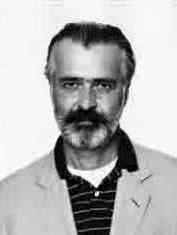 In
a day when it is permissible -- indeed obligatory -- to downspeak the
Iranians, I wish every American could read this book as I did in one
sitting last night. The insights it contains are too numerous to mention
here, but I can't let this one get by without sharing it (p. 196):
In
a day when it is permissible -- indeed obligatory -- to downspeak the
Iranians, I wish every American could read this book as I did in one
sitting last night. The insights it contains are too numerous to mention
here, but I can't let this one get by without sharing it (p. 196):
I don't think he was quite aware of the irony that the "fundamentalists" he spoke of in America were closer in philosophy to Muslim fundamentalists, his political enemies, than to anyone else in the West. It strikes me often while I am in Iran that were Christian evangelicals to take a tour of Iran today, they might find it the model for an ideal society they seek in America, Replace Allah with God, Mohammed with Jesus, keep the same public and private notions of chastity, sin, salvation, and God's will, and a Christian Republic is born.
Although Bush ran as the un-Clinton, he was in fact the anti-Jefferson, intent on pacifying the world of Islam by the use of force, while enjoying the support of theocratic rightists. The result the world over is that others see in America a nation full of angry Christians. Even if you conclude that modern-day Iran is a threat to Western values, this fact calls for statesmanship and not wrathful personal attacks. Read this book and you will better understand why.
Friday, February 6
7:38 PM Over at Theological German we're treated to a little tit-for-tatting between Barth and Bonhoeffer. Wonderful stuff. By the way, I keep running into Ph.D. students who think they can learn German without knowing how to pronounce the language correctly or read it aloud. I cannot imagine studying any modern language without trying to learn how to speak it. Just doesn't make any sense to me to do it that way. Each of my beginning Greek students at Bethel Hill has received a pronunciation CD, and I hope they are making use of it. The ear gate is always needed to reinforce the eye and hand gates.

Dinner, by the way, was DELICIOUS.
6:46 PM B's just started cooking dinner. She tells me the menu tonight is turkey, mashed potatoes, and fried okra. Have I died and gone to heaven? More good news: Starting tomorrow the lows will be above freezing for the foreseeable future. This will be a nice respite from the frigid temps we've been having. My suspicion is that Nathan is going to take advantage of the warmer weather and put his dear old dad to work again tomorrow. But let tomorrow worry about itself! Right now it's time to cozy up with a good book.
4:54 PM I've felt for years that one of the most essential needs of the church is to have a knowledge of the basics of the New Testament. Our seminaries have this basic requirement. Why can't our churches at least teach a general overview of the New Testament to their people? You see I'm already looking to my next course at Bethel Hill! In the meantime, we've still got plenty of work to do in our Greek class. Students, remember that the purpose of this class is to acquaint you with the basics of Koine Greek so that you may get to know the Author of the New Testament and better love and serve Him. Weekly faithfulness to the assigned work is the heart of this class. As I said at the beginning of the course, if you fall behind in a language class it is practically impossible to get caught up. So my challenge to you is to be sure to memorize the assigned paradigms (there are two of them) along with the vocabulary, and be prepared to translate the sentences in the exercises. You will also need to parse all the verbs you encounter, so do not forget to do that as you work through the sentences. Since this is brand spanking new information for most of you, we will begin Monday's class with some practice in parsing and, as always, will take any questions you have over the chapter. But I CANNOT DO THE WORK FOR YOU. My task is to teach and train you so that you might become more dedicated followers of the Lord Jesus so that ultimately He might make you into radical disciples who can plead "guilty" to scandalous love. None of this is possible without the filling of the Holy Spirit, so go ahead and ask God to fill you right now.
4:31 PM No big news here. I've been writing most of the day. Got about 4,000 words done. Becky's also been putting the computer through a workout. We work in shifts of 2 hours each. (This contraption has very high demand.) Earlier I took the puppies for a long walk. This is one of my favorite views of Bradford Hall.
The day was bright and sunny, but there was little warmth in it, at least earlier in the day. Of the three dogs only Dadya likes to eat snow. She can't seem to get enough of it.
Nate and Jess are at their Raleigh remodeling job again today, so we're keeping Sheppie, who spends most of his time laying around the house and keeping us company. What would life be like without our pets?
11:30 AM It's about time we brought you a detailed update on the Galana clinic in southern Ethiopia, don't you think?

And who better to write it than Becky, who grew up in nearby Gambo? I'm warning you: You are in for a great (and lengthy) treat today, so grab that cup of coffee, settle down in your recliner, and join us in praising God for what He is doing in Ethiopia. Here's a snippet from Becky's report:
Unlike many "religious" clinics, we do not require anyone to embrace Jesus Christ as Savior, or follow Him in their lives, but we are diligent to tell them the story of Jesus, so that they can know the option they have in Him. In the first three months of operation, 15 people chose to follow the Savior! Our chaplain Solomon is diligent to present the Savior at the clinic. He speaks to them as they are waiting, he plays Christian music over the loudspeaker, and he visits them in their homes. And after their decision, he connects them with a local church near their home for follow-up in teaching and discipleship.
You may have already heard this story, but when Michelangelo was once working on a huge piece of rock, someone asked him what he was doing. "I'm releasing the angel that is imprisoned in this marble," he replied. What a transformation there will be when the Master Builder finishes His work in our lives! Becky and I have been privileged to witness His strong and skilled hands shaping the Galana clinic, and He's not through yet. To all of you who have helped by praying, giving, sending, or going, our heartfelt thanks. What a beautiful picture of the Body of Christ -- a bunch of simple Jesus-followers bound to every other Jesus-follower in the world regardless of race, color, age, or denomination. I'm blown away by the beauty of Christ's bride! What a privilege to enjoy this kind of fellowship, show this kind of love, and bear one another's burdens in such a sacrificial way. Lobe den Herrn!
8:45 AM In Intermediate Greek class yesterday I asked my students this question: How Much Lettuce Is There in Heb. 12:1-2? It seems that our translations have too many vegetables in these verses. The point I was trying to make? Greek is useful not only for word studies but especially for discerning the original structure of a passage. It allows us to identify the salient points as well as the subordinate thoughts of the author. It also allows us (at least in this instance) to quote one of our favorite "theologians," Corrie ten Boom!
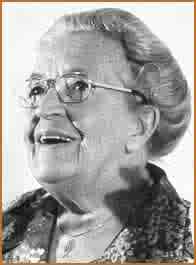
7:41 AM Well, it's new eyeglasses for me, both distance and reading. Bec's vision is doing fine. You should have heard B. practicing her Greek in the car. She is one motivated lady, I tell you. She can't wait to read her Greek New Testament.
Today it's back to writing for me, and a bit of blog surfing. If you peruse the Internet this morning, check out this essay: Endgame? What Endgame? It's Raimondo at his best, which usually means it's our country's leadership at its worst. I'm not saying there are deliberate villains in this whole sordid affair. It's simply a reminder that our leaders are human beings -- honest, hardworking, for the most part intelligent -- and every one of them capable of making the most horrendous mistakes of omission and commission.
Thursday, February 5
10:50 AM Drum roll, please. Introducing the world's first synchronized manure spreading team.
The weather was perfect for our work: 24 degrees with the ground frozen solid. I asked Nate how much all this manure would cost us if we didn't get it for free and bought fertilizer instead. He told me that each trailer load is worth at least $75 dollars. I added, "Plus all the great exercise we get. Don't have to go to the gym, do we?" To which he replied, "I should charge you for the workout, dad." Everyone's a comedian.
Right now Becky and I are off to eye doctor appointments in the big city of Danville.
7:50 AM One of the books Nate and Jess found at the thrift store is The Savage My Kinsman by Elizabeth Elliot, whose husband Jim was killed by the Auca Indians.
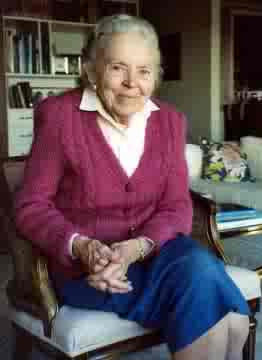
It is a great book, with many memorable quotes. Here's one I like the most (p. 15):
I had noticed throughout the Bible that, when God asked a man to do something, methods, means, materials, and specific directions were always provided. The man had only one thing to do: obey.
Often people will ask Becky (the organizer of our work in Ethiopia) what her 5-year or 10-year or 20-year plan is for our ministry. Her reply is always: to obey.
That's what a disciple is, friends! A disciple is one who simply obeys the Lord Jesus. If Jesus says, "Don't be letting people call you by all those manmade, prideful, ephemeral titles that mean so much to worldly people," then I must be willing to obey what He says. If He says, "Stop your dithering and get going into the entire world and share the Good News with every person God created," then I'd better get off my duff and get going. If He says, "Work when it's still daylight, because the night will be here real soon," then I'd better re-prioritize my schedule.
That's one of the great truths we're learning in our Greek exegesis of Philippians. The Gospel is so transforming, so vigorously powerful, that we cannot help but cooperate with other believers in taking it to the ends of the earth. That's where we start, relationally, to work out our faith. Evangelical ideologies of both the left and right lack this Gospel-centeredness; we are so busy building our own kingdoms. The key to understanding Philippians is to see it in the context of Gospel service. Paul is saying, "If you are a Christian, you are linked to every other Christian in the world and are brought with them into the orb of humble service for the Lord Jesus." It is only when we learn to show that kind of selflessness, that kind of love, that kind of koinonia, that we can become true Jesus-followers. Paul repeatedly hammers this point home in Philippians, both positively and negatively. Serving other people selflessly is the distinguishing mark of the Christian! To fail here is to fail completely in our responsibility as followers of Jesus Christ.
My heart is burdened this morning for those of us who can parse all the verbs in Philippians and who can explain its discourse structure but who are unmoved by its message.
7:19 AM I'm still looking for the following church marquee:
Senior Pastor: Jesus Christ
Ministers: Every Member
Assistants to the Ministers: Elders and Deacons
Now THAT will take some guts. Will your church be the first?
7:12 AM For an update on our March seminar on the church, go here.
6:54 AM My colleagues Mark Liederbach and Alvin-the-snake-man-Reid have just published a book called The Convergent Church. Kudos and congrats, guys! For product details, go to the Kregel site. I look forward to reading and learning from this book.
6:46 AM AlterNet has a first-rate story about how the Internet helped elect a president: How Obama Won: The Rise of Web 2.0. I gave a lecture at Yerevan State University in Armenia last year on how Ron Paul pushed the web to warp speed in his own campaign. More and more Christians are using the Internet to get out their message. Isn't it time you joined the cyber revolution?
6:33 AM Time Magazine is reporting on the exodus of pastors from rural churches. A key quote:
Why are the pastors disappearing? Mainline churches (as well as some Evangelical) prefer their ministers seminary trained. But the starting salary for debt-burdened seminary grads now runs to $35,000 a year.
Along these lines, in Philippians class this week we discussed how overseers and deacons (Phil. 1:1) in the New Testament arose from within their congregations and were not parachuted in from the outside, freshly minted by the seminary or Bible college. (See my essay, Church Leadership According to Philippians 1:1.) After class a student emailed me a link to an essay by Paul Harrison that appeared in the Journal of the Evangelical Theological Society. It's called "Pastoral Turnover and the Call to Preach" (.pdf). It's a brilliant article. Harrison effectively punctures the shallow assumption that professionally trained and "called" outsiders can have the same credibility and longevity in ministry that home-grown elders possess. Harrison reached four conclusions:
1) There are inherent flaws in the way most churches go about selecting pastors.
2) These flaws contribute to the undesirable result of frequent pastoral turnover.
3) The Scriptures present a picture of pastors being selected from within each congregation, this selection being understood to have been overseen by God.
4) There is no biblical evidence for what is commonly referred to as the call to preach.
Please find a place on the mantelpiece of your mind for these vital truths! How do we know who the leaders are in our churches today? The same way the early church came to perceive them: by their day-in and day-out lifestyle, by their pattern of consistent, selfless commitment to the Body, and by their level of spiritual maturity and wisdom (not their degrees or résumés).
I think it will take some heavy spiritual lifting to begin fleshing this out in our churches. Professional thinking permeates our culture. This is no less of our church subculture. The assumption is that one well-trained person (usually an import from the outside) can do the work better than any number of home-grown "amateurs." One negative consequence of this is a "professional mentality." This is a far cry from the every-member ministry focus of the New Testament. I've noticed that pastors tend to approach this problem in one of three ways:
1) Some seek to empower the laity by delegating certain functions to laypeople. The focus here is on performing tasks that will assist the pastor (e.g., hospital visitation, leading song service, serving communion, etc.).
2) Others focus on a select group of laypeople on the assumption that one day they too will sense the "call" to go into "fulltime ministry."
3) Still others, convicted by the biblical pattern, concentrate their efforts on preparing laypeople – all of them – for ministry. In a sense, these pastor-teachers are trying to work themselves out of a job or at least out of a "profession." In my opinion, this is the one approach most calculated to "de-professionalize" ministry and return it to the Body.
(I've noticed, by the way, a similar pattern in government. In the terminology of political science, one can speak of a "polyarchy" – a system of elite decision-making and public ratification. A specialized class of intellectuals is deemed necessary to manage the "common interests." Laypeople are to be spectators, not participants. Not that the herd has no function or utility: its duty is to support the leadership class through willing subordination. James Madison held that the power to govern must be delegated to "more capable … men" whose view of government is to protect the affairs of the wealthy against the democratic majority.)
The New Testament, of course, presents a much different model of the church. Leadership was provided through elders among the people whose function was to encourage the ministry of the entire church by the Holy Spirit. These leaders were always plural, and they never constituted a separate class from the laity. It's my constant hope and prayer that God's people will one day again be elevated to their true dignity as fulltime ministers of Jesus Christ. We are incurably proud of our own man-made systems. Often it is only when we find our defenses cracking and our resources dwindling that we turn to the Lord and call upon His name. When pastors face burnout because they have accepted an unhealthy and unbiblical model of leadership, perhaps God is doing them a great service.
One final quote from Harrison's outstanding essay:
To summarize, there is not one NT reference in which the language of calling is used of anyone other than the apostles unless the calling is to salvation. Not one pastor is referred to as having been called by God to ministry.
Amen and amen.
6:13 AM In the combox at his website, Wayne Lehman makes a statement that got me thinking:
I don't think there is a direct correlation between length of sentences and accurate translation. To go to the heart of your question, though, we should not translate the Bible more simply, or more complicated, for that matter, than the original manuscripts. This needs to be balanced with the fact that there are a variety of ways to say the same thing in translation. It is possible to use complicated Latin-based English words or more natural Germanic-based words (English is a Germanic language) to translate much of the Bible.
Let me test his hypothesis on part of a well-known verse (Eph. 4:12). The usual rending goes something like this: "To equip the saints for the work of the ministry." I much prefer a rendering that goes something like this: "To prepare God's people for works of service." In heaven today, I suspect, Paul is rejoicing regardless of how we translate his Greek here. But I do think the latter rendering is just as "faithful" to the Greek as the former one is and is perhaps even a "better" (more understandable) translation. Now, how many words in these translations are Latin-based and how many are Germanic-based? Here's my best guess:
Both "equip" and "prepare" are Latin-based. (Old French esquiper and Latin praeparare.)
Both "saints" and "people" are Latin-based. (Latin sanctus and Latin populus.)
Both "work" and "works" are Germanic-based. (German Werk.)
Both "ministry" and "service" are Latin-based. (Latin ministerium and Latin servitum.)
Thus, I'm not so sure that Latin-based words necessarily make a rendering more complicated, at least not in this one verse (which is hardly a fair sampling). (Wayne, if you've posted something on this, please send me the hyperlink.) Whichever rendering one prefers, however, the meaning seems clear: each of us is a living stone in the household of God, each of us is important for its upbuilding, each of us has "works of service" to perform, each of us is a priest in the holy temple of God. Then why should the sacrifices by offered by a select few?
Wednesday, February 4
7:37 PM Nate and Jessie raided the local thrift store today and found a ton of used books for sale. I'm off to their house to check out the booty. They've even threatened to serve me popcorn while I'm there.
7:31 PM The BBC labels the lack of pure drinking water in the world a crisis. When I read the BBC report, I thought of a recent email Becky sent out about the well we are trying to dig at the Burji clinic. The last line is vintage Becky.
It is now at 32 meters (almost 100 feet!). They keep thinking they will hit water...but no water yet! Now the "big wigs" of the well-drilling operation are coming to Burji to check the situation. As we get deeper, it impacts the pumps & alot of other things. Please pray for them especially in the next week, for travel safety & for wisdom as they try to discern what is the best thing to do. The diggers continue to be optimistic & happy in the work, and God has kept them safe...praise Him for these answers to prayer! We just need His guidance in the situation, and for Him to move the water level up a little :).
7:23 PM "I feel stunning, and entrancing, feel like running and dancing for joy...."

Okay, enough jumping up and down, but I received the most wonderful news this week. Becky, along with several others in our Greek class at Bethel Hill, received a perfect 109 on her first quiz. Go Becky! (No, guys, I didn't give her any special attention. She earned her grade by herself -- along with Lord's help of course.) Remember, this is the first time Becky has taken Greek in her entire life. So congratulations to her and to everyone else who slam-dunked the quiz.
By the way, in Monday night's class at Bethel Hill I witnessed another first. In 33 years of teaching Greek, I had never before received a quiz back from a student with the words "I love you" written on it.
"I feel stunning...."
Monday, February 2
4:05 PM News and notes: Spent the morning helping Nate and Jess clear a path down to the back creek. Cut a lot of firewood in the process (photo). Nate has 4 orders for firewood to fill (each order fills an entire trailer), so this wood will come in handy as soon as we split it.... Becky and I just spent 4 hours with a delightful missionary couple who are in the States on home assignment. I was privileged to visit with them on the field twice in the past 2 years. They are a treasure to the Body of Christ and a delight to be around.... Blogging buddy Jon Glass sent along a link to his latest essay; it's called Not a Typo But Unbiblical Teaching... The weatherman is calling for snow tonight. Be careful driving everyone.
7:33 AM Our first Greek quiz at Bethel Hill is just pocos minutos away. Who can blame a student if he or she feels anxious? But no one is more anxious than their teacher. Will they find time to study? Will they have memorized the alphabet? Will they have the stamina to make it to the end of the course? It's gonna be interesting, Toto.

7:25 AM This made me smile.
6:37 AM I'm not well suited to being a humorist, but there's a book my daughter Liz loaned me yesterday that begs to be read. To a classicist, the title alone is worth the read: Oxymoronica.
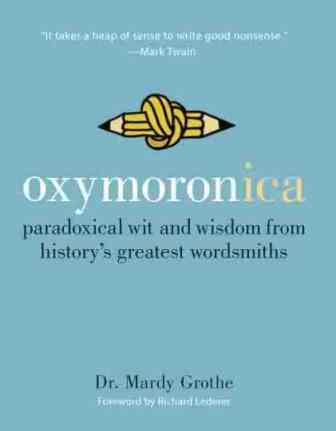
If you are as exhausted as I am by the faux culture wars of modern evangelicalism, you'll find this book a delightful change of pace. Here's my TOP TEN countdown:
10) "I am deeply superficial." A classic.
9) "Even his ignorance is encyclopedic." How true. I've often put it this way: "Have you ever met someone who was educated beyond his intelligence?"
8) "The more things change, the more they stay the same." Think Obama.
7) "We were at sea -- there is no other explanation -- on the plains of Nebraska."

Have you ever driven through Nebraska? I have. And through Montana. And through Texas. As far as the eye can see there is nothing but Nebraska or Montana or Texas. When we lived in Southern California we used to drive to Dallas every year. When we got to El Paso we were half way there.
6) "Last month I blew $5,000 on a reincarnation seminar. I figured, hey, you only live once." Just had to mention this one in light of our upcoming seminar.
5) "I hate intolerant people." Gloria Steinem at her worst.
4) "I have never let my schooling interfere with my education." Spoken by the great Mark Twain.
3) "People have one thing in common: they are all different." I just wrote about this one.
2) "Thanks to the interstate highway system, it is now possible to travel across the country from coast to coast without seeing anything." Charles Kuralt knew this from experience. This is one reason Becky and I drove from Dallas to Houston last year on side roads. How else can you expect to read all those road-side markers?
1) My favorite entry in the book is attributed to the Chinese sage Lao-Tzu, who more than 2,500 years ago said, "To lead the people, walk behind them." His point is one Scripture also makes: When people feel their leaders are truly "behind them," they will follow them almost anywhere. (Heb. 13:17, correctly translated, captures this notion nicely.)
So get this book and read it. It's serious fun.
Sunday, February 1
7:50 PM Kierkegaard once said, "My whole life is an epigram calculated to make people aware." He added, "I wish to make people aware so that they do not squander and dissipate their lives." One of my goals in life is to disabuse Christians of the notion that the only missionaries are professional missionaries. This was one of our themes as Becky and I spoke today at Mount Tirzah Baptist Church in the beautiful town of Charlotte Court House. God chooses everyday people -- people like you and me -- to be witnesses for Christ. Christendom is nothing but a lifeless shell of mediocrity, but real Christianity pulsates with life and energy. My message today from Matt. 9:35-38 was very simple: Be like Jesus, who came for one purpose, and that was to seek and to save that which was lost. A choice! That is what each and every one of us faces. Bec and I have made our choice: to be His witnesses worldwide. We pursue that calling -- in a very imperfect way -- but we are convinced that if we want to see a lost world won for Christ we must work local church to local church and hand in hand with average, everyday Christians. I delight to think that a pharmacist and a public school teacher and a homemaker can be used of God to establish a health clinic in Ethiopia. Who will join them in the work? Who from Mount Tirzah will serve Jesus though untrained, unpaid, and unprofessional? It seems inconceivable, even absurd, that God would choose to use me, yet He does. And He can and will use you too.
Below: The congregation listens intently to Becky as she tells the story of the Lord's work in Ethiopia.
After the service we met with several people, young and old, who had been praying for our Gondar evangelists by name. Becky was able to give them a recent photo of "their" evangelist and update them on the work being accomplished by God among the people of northern Ethiopia.
A thumb-harp and drum duet.
We spent the afternoon, of course, with Matt, Liz, Caleb, Isaac, and Micah. Caleb is quite the Greek scholar. You should have heard him and his Mama B reciting the Greek alphabet together. Mama B needs to work hard if she is to get a 109 on tomorrow night's quiz in Greek class.
Here's Isaac scooting and booting.
For supper we went to the local eatery for pizza...
... which Micah found most acceptable.
I gotta tell you, I had a great time at the Mount this morning. It was a joy for me to expound on the Scriptures, verse by verse and line by line. My hope in teaching this way is to create a desire in people to open the Bible and meditate upon it themselves. I try to speak in such a way that even children can understand what I'm saying. That's my goal, even if I don't always succeed!
